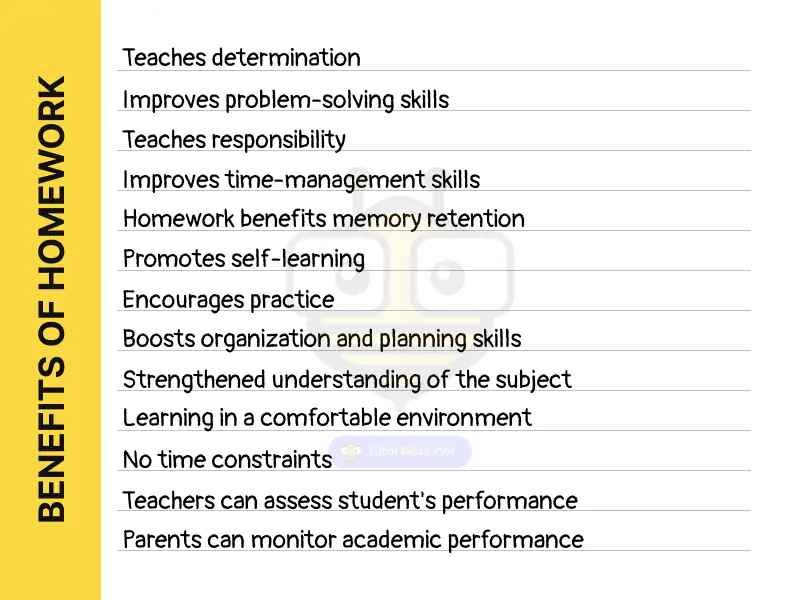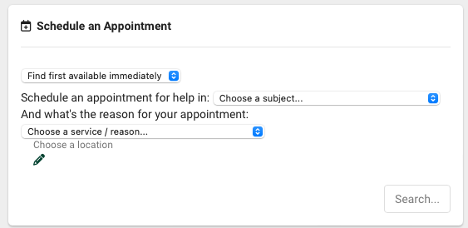

12 Amazing Ways to Improve Memory Power for Students

10 Best Piping Design Course Institutes in India

What are the Key Differences of fellowship and scholarship

Standing Out: What Sets React JS Apart from Other Frameworks

Is an Online MBA Worth It?
- Career & Jobs
- Career Guidance
- Study Abroad
- Personality Development

15 Surprising Benefits of Homework for Students
- The importance of homework for students
- 3 Helpful tips to do your homework effectively
- 15 benefits of homework
Homework is an important component of the learning and growing process. It is a common practice for students to develop their skills and learn new information.
Homework is simply a general term that we use to describe work that you have to do at home. Typically, it’s assigned by the teacher during school hours and meant to be completed after school in the evenings or weekends.
Homework is loved and hated by many, but it is an integral part of education. It is not just a boring part of the learning process. It has a lot to offer!
The Importance of Homework for Students
So, why should students have homework? According to research conducted by Duke University psychology professor Harris Cooper , there was a positive relation between homework and student achievement. He found out that homework can help students perform better in school.
This shows the importance of homework in a student’s life. Homework is not always popular with students because it takes away their free time at home.
However, there are many benefits associated with homework. Homework helps students understand the material in greater depth. Moreover, it allows teachers to assess how much the student has learned.
Tips for Doing Your Homework Faster
It is important to have a homework routine. A routine will help you know what to expect at the end of the day, and it will give you time to digest what you learned.
In addition, a routine will help you to be stress-free because you won’t be worrying about when to start your homework or whether you’re going to finish it on time.
So, here are some tips on how to set up a good homework routine:
- Find a place in the house where you can study without interruption.
- Set a timer for how long each assignment should take.
- Make sure your table is neat and that you have all of your materials ready before starting.
These tips will surely make your student life easier and put you on the right track towards higher grades!
The Benefits of Homework for Students
There are numerous reasons why homework is given in schools and colleges. Students can reap the benefits even in their professional lives.
But what exactly are the benefits of homework and how can it help students? Let us take a look at some of them:
1. Students Learn the Importance of Time Management

They will learn to balance play and work. Students will also learn to complete assignments within deadlines by learning to prioritize their time.
It helps them understand the importance of time management skills . When they are assigned a project or a test, they will know when it is due, how much time they have to complete it, and what they need to do.
This also helps them in their future careers. Employees must be able to manage their time efficiently in order to be successful.
If a project is due soon, employees should take effective steps to get it done on time. Homeworks in the schooling years teaches this practice of time management.
2. Promotes Self-Learning
Students get more time to review the content and this promotes self-learning . This is a big advantage of homework.
It also promotes continuous learning as students can revise their syllabus on their own. Homework gives them an opportunity to develop their critical thinking skills and problem-solving abilities.
3. Helps Teachers Assess a Student’s Learning
Homeworks help teachers track how well the students are grasping the content . They can modify their teaching methods based on the responses they receive from their students.
4. Teaches Students to Be Responsible
Students learn to become independent learners as they do their homework without any help from the teacher.
Studying at home also motivates students to study harder in order to achieve better results. This encourages them to take up more responsibilities at home too.
5. Boosts Memory Retention
Homework provides practice time to recall concepts discussed in class, thereby enabling students to memorize facts and figures taught at school.
One of the advantages of homework is that it sharpens memory power and concentration.
6. Enables Parents to Track a Student’s Performance
Parents can assess how well their children are doing with regard to academic performance by checking their homework assignments.
This gives parents a chance to discuss with teachers about improving their child’s performance at school .
7. Allows Students to Revise Content

Revising together with other students can also help with understanding information because it gives you another perspective, as well as an opportunity to ask questions and engage with others.
8. Practice Makes Perfect
Doing homework has numerous benefits for students. One of them is that it helps students learn the concepts in depth.
Homework teaches them how to apply the concepts to solve a problem. It gives them experience on how to solve problems using different techniques.
9. Develops Persistence
When students do their homework, they have to work hard to find all the possible solutions to a problem.
They have to try out different methods until they reach a solution that works. This teaches them perseverance and helps them develop their determination and grit to keep working hard.
10. Helps Them to Learn New Skills
Homework is important because it helps students to learn new and advanced skills. It promotes self-study, research and time management skills within students.
It also builds their confidence in tackling problems independently without constant help from teachers and parents.
11. Helps in Building a Positive Attitude Towards Learning

12. Students Can Explore Their Areas of Interest
Homework helps in building curiosity about a subject that excites them. Homework gives students an opportunity to immerse themselves in a subject matter.
When they become curious, they themselves take the initiative to learn more about it.
13. Encourages In-Depth Understanding of The Concepts
Homeworks allow students to learn the subject in a more detailed manner. It gives students the chance to recall and go over the content.
This will lead to better understanding and they will be able to remember the information for a long time.
14. Minimizes Screen Time:
Homework is not only a great way to get students to do their work themselves, but it can also encourage them to reduce screen time.
Homework gives students a good reason to stay off their computers and phones. Homework promotes the productive use of time .
15. Helps Develop Good Study Habits

The more they do their homework, the better they will get it. They will learn to manage their time in a more effective way and be able to do their work at a faster rate.
Moreover, they will be able to develop a good work ethic, which will help them in their future careers.
We all know that too much of anything can be bad. Homework is no different. If the workload of the students is too much, then it can lead to unnecessary stress .
Therefore, it is necessary for teachers to be mindful of the workload of students. That way, students will be able to enjoy their free time and actually enjoy doing homework instead of seeing it as a burden.
You Might Also Like
How to write and evaluate algebraic expressions: a beginner’s guide, interactive learning: how slideshows enhance student engagement, how to convert an assignment document into text, leave a reply cancel reply.
Your email address will not be published. Required fields are marked *
Save my name, email, and website in this browser for the next time I comment.
Weekly Newsletter
subscribe to our latest blog and weekly newsletter
Popular News

Questions to Ask Yourself Before Choosing Your Career Path
- Advertisement -

- Certifications
Top Categories
Subscribe us, for quick admission assistance.

Sign in to your account
Username or Email Address
Remember Me
20 Reasons Why Homework is Good: Unlocking the Benefits

- Post author By admin
- October 26, 2023
Explore the compelling 20 reasons why homework is good, fostering skills and knowledge that extend beyond the classroom
Ah, homework – a topic that has fueled countless debates in the world of education. Is it a valuable learning tool or a relentless academic burden?
In this article, we’re going to shift the spotlight onto the often-overlooked positive side of homework. We’ll unveil not one or two, but a whopping 20 compelling reasons why homework is genuinely good for students.
From solidifying classroom knowledge to honing critical thinking skills, homework is far more than just an academic chore. It’s an essential building block of learning.
So, whether you’ve questioned the purpose of homework or are simply curious about its merits, join us on this journey as we explore the myriad ways homework benefits students of all ages.
Get ready to discover why homework is a treasure trove of learning opportunities!
Table of Contents
20 Reasons Why Homework is Good
Check out 20 reasons why homework is good:-
1. Reinforcement of Classroom Learning
Homework isn’t just a mundane task; it’s your secret weapon for becoming a true subject matter aficionado. It’s the place where classroom theories transform into real-world skills.
Homework, in all its wisdom, lets you roll up your sleeves and practice what you’ve learned in class, turning those lightbulb moments into permanent knowledge fixtures.
Just like a musician perfecting a melody or an artist refining their masterpiece, homework is your training ground for excellence. So, embrace it, for every assignment is a stepping stone on your path to mastery.
2. Development of Responsibility
Homework isn’t just about books and assignments; it’s a grooming ground for something equally important – responsibility.
It’s like a trusty mentor, teaching students to take charge, manage their time, and complete tasks independently.
It’s that early taste of adulthood, where you learn that success often depends on your own commitment and effort.
So, think of homework as your guide on the journey to becoming a responsible, self-reliant individual, armed with skills that will serve you well in all walks of life.
3. Improved Time Management Skills
Homework is more than just assignments; it’s a boot camp for one of life’s essential skills – time management. Think of it as a mini dress rehearsal for adulthood.
Homework teaches students to allocate their time wisely, ensuring they meet deadlines and complete tasks efficiently. It’s like learning to juggle multiple balls, a skill that will serve them well in their adult lives. So, embrace homework as your friendly time-management coach, preparing you for the real world’s challenges.
4. Enhanced Critical Thinking
Homework is not just about finding answers; it’s your secret laboratory for unleashing the power of critical thinking.
It’s the arena where you get to be the detective, dissect problems, and engineer ingenious solutions. Think of it as mental gymnastics, where your cognitive muscles get a thorough workout.
The more you dive into those homework challenges, the sharper your critical thinking skills become. So, consider homework your daily brain boot camp, molding you into a savvy problem-solver with talents that extend way beyond the classroom.
5. Preparation for the Future
Homework isn’t just about cracking textbooks; it’s your sneak peek into the future. Think of it as your personal time machine, where you’re not just solving equations but honing skills that will propel you to success in higher education and the professional arena.
It’s like laying the stepping stones to your dream career. From mastering time management to sharpening critical thinking, homework is your trusted mentor, preparing you for the exciting journey ahead.
So, when you’re poring over those assignments, remember – you’re not just studying, you’re shaping a future filled with possibilities.
6. Encouragement of Self-Discipline
Homework isn’t just about filling out worksheets; it’s the canvas on which students paint their self-discipline and self-motivation masterpieces.
It’s like training for life’s grand adventure. With homework, you’re the captain, setting sail on a sea of assignments.
Completing homework isn’t merely about meeting deadlines; it’s about cultivating skills that become your secret weapons in the real world.
So, think of homework as your personal training ground for self-discipline, sculpting you into a resilient and motivated individual who’s ready to conquer life’s challenges.
7. Review of Material
Homework isn’t just an additional task; it’s your golden opportunity to revisit and cement what you’ve learned in class.
Think of it as your personal review session, where you go through the key points and solidify your understanding. Just as an artist refines their masterpiece or a musician practices their chords, homework is your tool for perfection.
The more you review and consolidate, the stronger your grasp on the subject matter becomes. So, embrace homework as your trusted ally in mastering the art of revision, making you a confident and knowledgeable learner.
8. Practice Makes Perfect
Homework isn’t a chore; it’s your backstage pass to perfection. It’s like the endless rehearsals of a musician or the tireless drills of an athlete.
Homework is your playground for practice, where you can fine-tune your skills, ensuring you become a true master in various subjects. Just as a chef perfects a recipe through repetition, your homework is the recipe for excellence.
So, when you’re diving into those assignments, think of them as your chance to practice, practice, and practice some more, turning you into a subject maestro.
9. Teacher-Student Interaction
Homework isn’t just about cracking the books; it’s your backstage pass to building strong connections with your teachers.
It’s like sending an open invitation to ask questions and seek guidance. Homework transforms the student-teacher relationship from a formal handshake into a hearty conversation.
When you embrace homework, you’re not just solving problems; you’re forging connections that can last a lifetime.
So, think of homework as your golden opportunity for dialogue, where you can foster positive relationships with your teachers and make your educational journey all the more engaging and rewarding.
10. Parental Involvement
Homework isn’t just a student’s duty; it’s a chance for families to bond over learning. It’s like the thread that weaves the classroom and home together, allowing parents to actively participate in their child’s education.
Homework transforms the learning experience into a shared adventure where everyone can join in the fun. When parents dive into homework with their kids, it’s not just about helping with math problems.
It’s about creating moments of connection, offering support, and sharing in the educational journey. So, think of homework as the gateway to family engagement in education, making learning a joyful family affair.
11. Real-Life Application
Homework isn’t just about hitting the books; it’s your backstage pass to making knowledge practical. It’s like a secret bridge that connects the world of theory with the realm of real-life application.
Homework transforms you from a passive learner into an active doer. It’s where you take those classroom ideas and put them into action, just like a scientist testing a hypothesis or an engineer building a bridge.
So, consider homework your personal laboratory for bringing theories to life, where you turn bookish knowledge into real-world magic, making your education a thrilling adventure.
12. Different Learning Styles
Homework isn’t a one-size-fits-all deal; it’s more like a treasure map that caters to diverse learning styles. Imagine it as a chameleon, changing its colors to suit both visual and kinesthetic learners.
Homework knows that we’re all unique, with our own special ways of learning. For those who thrive on visuals, it serves up graphs and illustrations, while the hands-on learners get to dive into practical tasks.
It’s a bit like having a tailor-made suit for education. So, consider homework your personal guide, offering a learning experience that’s as unique as you are, making education a captivating and natural journey.
| : |
13. Time for Creativity
Homework isn’t a creativity crusher; it’s your chance to let your imagination soar. Think of it as a blank canvas waiting for your ideas to paint it with vibrant colors.
Homework isn’t about rules and conformity; it’s about independent thinking and the freedom to express yourself. Whether you’re crafting an essay, brainstorming a unique solution, or designing a project, homework is your invitation to let your creativity shine.
So, consider homework your personal creative playground, where you can set your ideas free, turning learning into an exciting and imaginative adventure.
14. Enhancement of Research Skills
Homework isn’t just about checking off tasks; it’s your secret lair for honing research skills, those superpowers that will supercharge your success in both academics and the real world.
Think of it as your personal training ground where you become a detective of knowledge, learning to explore, dig deep, and unearth answers.
Whether you’re delving into the depths of the library, surfing the web, or conducting surveys, research-based homework transforms you into a skilled investigator.
So, consider homework your gateway to the world of research, where you unlock skills that will not only power your academic journey but also your lifelong adventures.
15. Test Preparation
Homework isn’t just a mundane task; it’s your secret weapon for conquering exams. Think of it as your personal exam prep coach, crafting a roadmap for success.
Homework lets you revisit, revise, and sharpen your skills, so when test day arrives, you’re ready to shine. It’s not just about finishing assignments; it’s about building your confidence for those crucial exams.
So, consider homework your trusty sidekick on the path to acing tests, making your educational journey an exciting adventure.
16. Increased Engagement
Homework isn’t a homework. It’s more like an after-class adventure that keeps the excitement of learning alive. Think of it as your personal quest, where you get to explore the subjects that genuinely pique your interest.
Homework isn’t about killing time; it’s your ticket to stay engaged with your learning journey, even when the school day ends.
So, when you’re tackling your assignments, remember you’re not just checking off tasks; you’re stoking the flames of curiosity, making education an exhilarating and never-ending journey.
17. Achievement of Learning Objectives
Homework isn’t just a jumble of tasks; it’s your trusted guide leading you to specific educational victories. Picture it as your personal GPS, keeping you on track to reach those learning milestones.
Homework is where you make the connections, reinforce classroom knowledge, and make your education rock-solid. It’s not just about answering questions; it’s about ensuring you hit those educational bullseyes.
So, when you’re diving into your assignments, remember you’re not just ticking off tasks; you’re on a journey to academic success, turning each homework into a stepping stone toward your goals.
18. Inclusivity
Homework isn’t a one-size-fits-all deal; it’s your versatile tool to celebrate the uniqueness of every student. Imagine it as a buffet, serving up options for both fast learners and those who want some extra practice.
Homework understands that every student is as unique as a fingerprint, each with their own pace and learning style.
For the quick learners, it offers challenges and exciting extensions, while those who prefer more practice can dive into additional exercises.
It’s like a school that dances to your rhythm, ensuring every student has a path to success. So, think of homework as your personal learning adventure, offering choices that fit your taste, making education an exciting and inclusive journey.
19. Fosters Independence
Homework isn’t about spoon-feeding answers; it’s your nurturing ground for independent thinking and decision-making.
Think of it as a playground where you get to flex your decision muscles and spread your intellectual wings. Homework is your training camp for self-reliance, where you take charge of your learning adventure.
20. Overall Academic Improvement
Homework isn’t just a stack of assignments; it’s the secret ingredient for overall academic improvement. Think of it as the magic wand that, when waved effectively, leads to better grades and educational triumphs.
Homework isn’t a mere task list; it’s your strategic ally in the journey of learning. When used wisely, it’s your key to success, a bridge to better understanding and superior educational outcomes.
So, when you’re tackling your homework, remember you’re not just ticking off tasks; you’re paving the way for academic excellence, turning each assignment into a step towards achieving your educational goals.
What are 5 benefits of homework?
Homework is more than just a list of tasks; it’s a powerhouse of benefits that can transform a student’s learning journey. Here are the top five advantages:
1. Supercharging Learning
Homework isn’t about mindless repetition; it’s your secret weapon to reinforce what you’ve learned in class. It’s like a memory boost that makes sure you remember the important stuff for the long haul.
2. Mastering Time and Study Skills
Homework teaches you real-world skills that go way beyond the textbook. It’s your personal coach for time management and setting priorities.
Plus, it’s your go-to guide for developing top-notch study habits like staying organized, taking killer notes, and acing those tests.
3. Fueling Grit and Responsibility
Homework is your training ground for building self-discipline and a sense of responsibility. It’s where you learn to motivate yourself and tackle challenges head-on, no matter how tough they seem.
4. Sparking Creativity and Critical Thinking
Homework isn’t a one-way street. It’s your canvas for thinking outside the box and analyzing what you’re learning from all angles. It’s your chance to bring your unique ideas to the table.
5. Strengthening Home-School Bonds
Homework isn’t just about you; it’s a connection point for your parents and teachers. It’s where they get a front-row seat to your education and can lend a hand when you need it.
But, remember, like any tool, homework works best when used wisely. Too much of a good thing can lead to stress, so strike that balance, and make homework your learning ally.
Who invented homework 😡?
The roots of homework can be traced back to a frustrated Italian educator, Roberto Nevilis, who lived in the 17th century.
He was perplexed by his students’ struggles to retain their classroom lessons, and so, he devised a novel solution – homework.
By assigning tasks that required students to practice and reinforce what they’d learned in class, Nevilis hoped to bridge the knowledge gap. His ingenious idea didn’t stop at the classroom door; it spread like wildfire, first across Europe and eventually finding its way to the United States.
While Nevilis is often credited with inventing homework, history leaves some room for debate. Some scholars argue that homework may have had earlier incarnations in ancient Greece and Rome, although concrete evidence is scarce.
What’s more likely is that Nevilis was among the first to formalize the concept of homework as we understand it today.
No matter its true origin, homework has become an integral part of education worldwide. It spans across the spectrum, from the youngest elementary students to those pursuing higher education.
The purpose of homework has also evolved over time. While Nevilis initially introduced homework to help students retain information, today, its role is multifaceted. It serves as a training ground for critical thinking, problem-solving, and nurturing creativity.
Whether you view homework as a boon or a bane, one thing is certain – it has a rich and varied history, and it’s likely to continue shaping the educational landscape for the foreseeable future.
Why is homework good for your brain?
Homework isn’t just about completing assignments; it’s a brain-boosting wizard. Let’s delve into the captivating reasons why homework is a mind-enhancing elixir:
Fortifying Neural Pathways
Imagine your brain as a labyrinth of pathways. When you learn something new, it’s like carving a fresh trail. Homework? It’s your trusty path-paver, helping you practice and reinforce what you’ve learned. This makes recalling information a breeze down the road.
Mastering Executive Function Skills
Executive function skills are like your brain’s personal assistants. They help you plan, organize, and manage your time effectively.
Homework transforms you into the CEO of your tasks, requiring you to set goals, juggle priorities, and work independently.
Cultivating Cognitive Flexibility
Ever wished you could tackle problems from various angles? That’s cognitive flexibility, a superpower for your brain. Homework serves as the playground where you can flex your mental muscles, applying your knowledge to novel challenges.
Boosting Self-Efficacy
Self-efficacy is your belief in your own success. Homework is your arena for personal victories. Achieving your homework goals and witnessing your growth over time? That’s a confidence booster like no other.
Stress Alleviation
While homework might occasionally seem like a stress-inducing monster, it’s also your coach for the stress-relief Olympics. How?
It equips you with the skills to tackle challenges and manage your time wisely, ultimately reducing stress in the long run.
But, here’s the catch: balance is key. Too much homework can tip the scales. To maximize the magical benefits, you need to find harmony between homework and other essential activities like sleep, exercise, and hanging out with friends.
In a nutshell, homework isn’t just about completing assignments; it’s your secret weapon for unlocking your brain’s potential. It boosts learning and memory, nurtures executive function skills, hones cognitive flexibility, elevates self-efficacy, and even helps you conquer stress.
As we draw the curtain on our exploration of the twenty compelling reasons that make homework a valuable asset, it’s evident that homework is more than just a to-do list. It’s a treasure trove of advantages that students can unearth on their academic journey.
From fortifying those neural pathways to nurturing independence, and from honing research skills to prepping for the challenges that await in the future, homework is a versatile tool. It’s the canvas where creativity flourishes, bridging the gap between theory and practice, and inviting parents into their child’s scholastic odyssey.
Homework doesn’t just aid in academic mastery; it’s a comprehensive roadmap for personal growth and development. It nudges you towards self-discipline, sprinkles in a dash of responsibility, and offers a slice of the sweet taste of accomplishment.
However, as in any art, balance is key. The right amount of homework, harmonized with other life activities, is the secret recipe for success.
So, as you tackle your next homework assignment, remember this: you’re not just completing tasks; you’re shaping a brighter future, one thought at a time.
Frequently Asked Questions
Is homework always beneficial for students.
Homework can be beneficial when thoughtfully assigned, but excessive or irrelevant homework may have negative effects.
How can parents support their child’s homework routine?
Parents can provide a quiet, organized workspace, offer assistance when needed, and encourage good study habits.
How much homework is too much?
The right amount of homework varies by grade level and individual needs. It should challenge without overwhelming students.
What can teachers do to make homework more effective?
Teachers should assign purposeful, relevant homework, provide clear instructions, and offer support when necessary.
How does homework help prepare students for the future?
Homework instills responsibility, time management, and critical thinking skills, all of which are valuable in higher education and the workforce.
- australia (2)
- duolingo (13)
- Education (284)
- General (78)
- How To (18)
- IELTS (127)
- Latest Updates (162)
- Malta Visa (6)
- Permanent residency (1)
- Programming (31)
- Scholarship (1)
- Sponsored (4)
- Study Abroad (187)
- Technology (12)
- work permit (8)
Recent Posts


Home > Blog > Tips for Online Students > The Pros and Cons of Homework
School Life Balance , Tips for Online Students
The Pros and Cons of Homework
Updated: July 16, 2024
Published: January 23, 2020

Remember those nights when you’d find yourself staring at a mountain of homework, eyes drooping, wondering if you’d ever see the light at the end of the tunnel? The debate over homework’s role in education is as old as time. Is it a crucial tool for reinforcing learning or just an unnecessary burden?
For college students, this question takes on new dimensions. Juggling homework with the endless amount of classes, part-time jobs, and social lives can feel like walking on thin ice. The pressure to maintain grades, meet deadlines, and still find time for friends and relaxation can be overwhelming. So, is homework a friend or foe?

Photo by energepic.com from Pexels
The homework dilemma.
A large amount of college students report feeling overwhelmed by their academic workload, leading to high levels of stress and anxiety. According to Research.com , 45% of college students in the U.S. experience “more than average” stress, with 36.5% citing stress as a major impediment to their academic performance. This stress often stems directly from the homework load, leading to symptoms like headaches, exhaustion, and difficulty sleeping. The intense pressure to manage homework alongside other responsibilities makes us question the true impact of homework on students’ overall well-being.
And then there’s the digital twist. A whopping 89% of students confessed to using AI tools like ChatGPT for their assignments. While these tools can be a godsend for quick answers and assistance, they can also undermine the personal effort and critical thinking necessary to truly understand the material.
On the brighter side, homework can be a powerful ally. According to Inside Higher Ed , structured assignments can actually help reduce stress by providing a clear learning roadmap and keeping students engaged with the material. But where’s the balance between helpful and harmful?
With these perspectives in mind, let’s dive into the pros and cons of homework for college students. By understanding both sides, we can find a middle ground that maximizes learning while keeping stress at bay.
The Pros of Homework
When thoughtfully assigned, homework can be a valuable tool in a student’s educational journey . Let’s explore how homework can be a beneficial companion to your studies:
Enhances Critical Thinking
Homework isn’t just busywork; it’s an opportunity to stretch your mental muscles. Those late-night problem sets and essays can actually encourage deeper understanding and application of concepts. Think of homework as a mental gym; each assignment is a new exercise, pushing you to analyze, synthesize, and evaluate information in ways that strengthen your critical thinking skills .
Time Management Skills
Do you ever juggle multiple deadlines and wonder how to keep it all together? Regular homework assignments can be a crash course in time management . They teach you to prioritize tasks, manage your schedule, and balance academic responsibilities with personal commitments. The ability to juggle various tasks is a skill that will serve you well beyond your college years.
Reinforcement of Learning
There’s a reason why practice makes perfect. Homework reinforces what you’ve learned in class, helping to cement concepts and theories in your mind. Understanding a concept during a lecture is one thing, but applying it through homework can deepen your comprehension and retention.
Preparation for Exams
Think of homework as a sound check and warm-up for exams. Regular assignments keep you engaged with the material, making it easier to review and prepare when exam time rolls around. By consistently working through problems and writing essays, you build a solid foundation that can make the difference between cramming and confident exam performance.
Encourages Independent Learning
Homework promotes a sense of responsibility and independence. It pushes you to tackle assignments on your own, encouraging problem-solving and self-discipline. This independence prepares you for the academic challenges ahead and the autonomy required in your professional and personal life.

The Cons of Homework
Despite its potential benefits, homework can also have significant downsides. Let’s examine the challenges and drawbacks of homework:
Impact on Mental Health
Homework can be a double-edged sword when it comes to mental health . While it’s meant to reinforce learning, the sheer volume of assignments can lead to stress and anxiety. The constant pressure to meet deadlines and the fear of falling behind can create a relentless cycle of stress. Many students become overwhelmed, leading to burnout and negatively impacting their overall well-being.
Limited Time for Other Activities
College isn’t just about hitting the books. It’s also a time for personal growth, exploring new interests, and building social connections. Excessive homework can eat into the time you might otherwise spend on extracurricular activities, hobbies, or simply hanging out with friends. This lack of balance can lead to a less fulfilling college experience. Shouldn’t education be about more than just academics?
Quality Over Quantity
When it comes to homework, more isn’t always better. Piling on assignments can lead to diminished returns on learning. Instead of diving deep into a subject and gaining a thorough understanding, students might rush through tasks just to get them done. This focus on quantity over quality can undermine the educational value of homework.
Inequity in Education
Homework can sometimes exacerbate educational inequalities. Not all students can access the same resources and support systems at home. While some might have a quiet space and access to the internet, others might struggle with distractions and lack of resources. This disparity can put certain students at a disadvantage, making homework more of a burden than a learning tool.
Dependence on AI Tools
With the advent of AI tools like ChatGPT , homework has taken on a new dimension. While these tools can provide quick answers and assistance, they also pose the risk of students becoming overly reliant on technology. This dependence can take away from the actual learning process, as students might bypass the critical thinking and effort needed to truly understand the material. Is convenience worth the potential loss in learning?
Finding the Balance
Finding the right balance with homework means tackling assignments that challenge and support you. Instead of drowning in a sea of tasks, focus on quality over quantity. Choose projects that spark your critical thinking and connect to real-world situations. Flexibility is key here. Recognize that your circumstances are unique, and adjusting your approach can help reduce stress and create a more inclusive learning environment. Constructive feedback makes homework more than just a chore; it turns it into a tool for growth and improvement.
It’s also about living a well-rounded college life. Don’t let homework overshadow other important parts of your life, like extracurricular activities or personal downtime. Emphasize independent learning and use technology wisely to prepare for future challenges. By balancing thoughtful assignments with your personal needs, homework can shift from being a burden to becoming a helpful companion on your educational journey, enriching your academic and personal growth.
Homework has its pros and cons, especially for college students. It can enhance critical thinking, time management, and learning, but it also brings stress, impacts mental health, and can become overwhelming. Finding the right balance is key.
Focus on quality assignments, maintain flexibility, and make sure your homework complements rather than dominates your life. With a thoughtful approach, homework can support your educational journey, fostering both academic success and personal growth.
How can I manage my time effectively to balance homework and other activities?
Create a schedule that allocates specific times for homework, classes, and personal activities. Use planners or digital calendars to keep track of deadlines and prioritize tasks. Don’t forget to include breaks to avoid burnout.
How can I reduce the stress associated with homework?
To manage stress, practice mindfulness techniques like meditation or deep breathing exercises. Break assignments into smaller, manageable tasks and tackle them one at a time. If needed, seek support from classmates, tutors, or mental health professionals.
Is using AI tools for homework cheating?
While AI tools like ChatGPT can be helpful for quick assistance, relying on them too much can hinder your learning process. Use them as a supplement rather than a replacement for your own effort and critical thinking.
How can teachers make homework more equitable?
Teachers can offer flexible deadlines, provide resources for students who lack them, and design assignments that account for different learning styles and home environments. Open communication between students and teachers can also help address individual challenges.
What are some strategies to make homework more meaningful?
Focus on quality over quantity by designing assignments that encourage deep thinking and application of knowledge. Integrate real-world problems to make homework more relevant and engaging. Provide constructive feedback to help students learn and grow from their assignments.
In this article
At UoPeople, our blog writers are thinkers, researchers, and experts dedicated to curating articles relevant to our mission: making higher education accessible to everyone. Read More
Our websites may use cookies to personalize and enhance your experience. By continuing without changing your cookie settings, you agree to this collection. For more information, please see our University Websites Privacy Notice .
Neag School of Education
How to use homework to support student success.
- by: Sandra Chafouleas
- January 13, 2022
- Community Engagement

Editor’s Note: Board of Trustees Distinguished Professor Sandra Chafouleas shares insights on supporting students’ homework during the pandemic in the following piece, which originally appeared in Psychology Today , where she publishes a blog.
COVID has brought many changes in education. What does it mean for homework?
School assignments that a student is expected to do outside of the regular school day—that’s homework. The general guideline is 10 minutes of nightly homework per grade level beginning after kindergarten. This amounts to just a few minutes for younger elementary students to up to 2 hours for high school students.
The guidance seems straightforward enough, so why is homework such a controversial topic? School disruptions, including extended periods of remote learning during the COVID-19 pandemic, have magnified the controversies yet also have provided an opportunity to rethink the purpose and value of homework.
Debates about the value of homework center around two primary issues: amount and inequity.
First, the amount of assigned homework may be much more than the recommended guidelines. Families report their children are stressed out over the time spent doing homework. Too much homework can challenge well-being given the restricted time available for sleep, exercise, and social connection. In a 2015 study , for example, parents reported their early elementary children received almost three times the recommended guidelines. In high school, researchers found an average of three hours of homework per night for students living in economically privileged communities.
“ Debates about the value of homework center around two primary issues: amount and inequity.”
Second, homework can perpetuate inequities. Students attending school in less economically privileged communities may receive little to no homework, or have difficulty completing it due to limited access to needed technology. This can translate into fewer opportunities to learn and may contribute to gaps in achievement.
There isn’t a ton of research on the effects of homework, and available studies certainly do not provide a simple answer. For example, a 2006 synthesis of studies suggested a positive influence between homework completion and academic achievement for middle and high school students. Supporters also point out that homework offers additional opportunities to engage in learning and that it can foster independent learning habits such as planning and a sense of responsibility. A more recent study involving 13-year-old students in Spain found higher test scores for those who were regularly assigned homework in math and science, with an optimal time around one hour—which is roughly aligned with recommendations. However, the researchers noted that ability to independently do the work, student effort, and prior achievement were more important contributors than time spent.
Opponents of homework maintain that the academic benefit does not outweigh the toll on well-being. Researchers have observed student stress, physical health problems, and lack of life balance, especially when the time spent goes over the recommended guidelines. In a survey of adolescents , over half reported the amount and type of homework they received to be a primary source of stress in their lives. In addition, vast differences exist in access and availability of supports, such as internet connection, adult assistance, or even a place to call home, as 1.5 million children experience homelessness in the United States
The COVID-19 pandemic has re-energized discussion about homework practices, with the goal to advance recommendations about how, when, and with whom it can be best used. Here’s a summary of key strategies:
Strategies for Educators
Make sure the tasks are meaningful and matched..
First, the motto “ quality over quantity ” can guide decisions about homework. Homework is not busy-work, and instead should get students excited about learning. Emphasize activities that facilitate choice and interest to extend learning, like choose your own reading adventure or math games. Second, each student should be able to complete homework independently with success. Think about Goldilocks: To be effective, assignments should be just right for each learner. One example of how do this efficiently is through online learning platforms that can efficiently adjust to skill level and can be completed in a reasonable amount of time.
Ensure access to resources for task completion.
One step toward equity is to ensure access to necessary resources such as time, space, and materials. Teach students about preparing for homework success, allocating classroom time to model and practice good study habits such as setting up their physical environment, time management, and chunking tasks. Engage in conversations with students and families to problem-solve challenges When needed, connect students with homework supports available through after-school clubs, other community supports, or even within a dedicated block during the school day.
Be open to revisiting homework policies and practices.
The days of penalizing students for not completing homework should be long gone. Homework is a tool for practicing content and learning self-management. With that in mind, provide opportunities for students to communicate needs, and respond by revising assignments or allowing them to turn in on alternative dates. Engage in adult professional learning about high-quality homework , from value (Should I assign this task?) to evaluation (How should this be graded? Did that homework assignment result in expected outcomes?). Monitor how things are going by looking at completion rates and by asking students for their feedback. Be willing to adapt the homework schedule or expectations based on what is learned.
Strategies for Families
Understand how to be a good helper..
When designed appropriately, students should be able to complete homework with independence. Limit homework wars by working to be a good helper. Hovering, micromanaging, or doing homework for them may be easiest in the moment but does not help build their independence. Be a good helper by asking guiding questions, providing hints, or checking for understanding. Focus your assistance on setting up structures for homework success, like space and time.
Use homework as a tool for communication.
Use homework as a vehicle to foster family-school communication. Families can use homework as an opportunity to open conversations about specific assignments or classes, peer relationships, or even sleep quality that may be impacting student success. For younger students, using a daily or weekly home-school notebook or planner can be one way to share information. For older students, help them practice communicating their needs and provide support as needed.
Make sure to balance wellness.
Like adults, children need a healthy work-life balance. Positive social connection and engagement in pleasurable activities are important core principles to foster well-being . Monitor the load of homework and other structured activities to make sure there is time in the daily routine for play. Play can mean different things to different children: getting outside, reading for pleasure, and yes, even gaming. Just try to ensure that activities include a mix of health-focused activities such as physical movement or mindfulness downtime.

The Council for the Accreditation of Educator Preparation (CAEP) accredits the Neag School of Education at the University of Connecticut. Read more about CAEP Accreditation, including the programs covered and the accountability measures .
Some content on this website may require the use of a plug-in, such as Adobe Acrobat Viewer .
- Support the Neag School
Neag School of Education 249 Glenbrook Road, Unit 3064 Charles B. Gentry Building Storrs, CT 06269-3064
860-486-3815 [email protected]

Is homework a necessary evil?
After decades of debate, researchers are still sorting out the truth about homework’s pros and cons. One point they can agree on: Quality assignments matter.
By Kirsten Weir
March 2016, Vol 47, No. 3
Print version: page 36

- Schools and Classrooms
Homework battles have raged for decades. For as long as kids have been whining about doing their homework, parents and education reformers have complained that homework's benefits are dubious. Meanwhile many teachers argue that take-home lessons are key to helping students learn. Now, as schools are shifting to the new (and hotly debated) Common Core curriculum standards, educators, administrators and researchers are turning a fresh eye toward the question of homework's value.
But when it comes to deciphering the research literature on the subject, homework is anything but an open book.
The 10-minute rule
In many ways, homework seems like common sense. Spend more time practicing multiplication or studying Spanish vocabulary and you should get better at math or Spanish. But it may not be that simple.
Homework can indeed produce academic benefits, such as increased understanding and retention of the material, says Duke University social psychologist Harris Cooper, PhD, one of the nation's leading homework researchers. But not all students benefit. In a review of studies published from 1987 to 2003, Cooper and his colleagues found that homework was linked to better test scores in high school and, to a lesser degree, in middle school. Yet they found only faint evidence that homework provided academic benefit in elementary school ( Review of Educational Research , 2006).
Then again, test scores aren't everything. Homework proponents also cite the nonacademic advantages it might confer, such as the development of personal responsibility, good study habits and time-management skills. But as to hard evidence of those benefits, "the jury is still out," says Mollie Galloway, PhD, associate professor of educational leadership at Lewis & Clark College in Portland, Oregon. "I think there's a focus on assigning homework because [teachers] think it has these positive outcomes for study skills and habits. But we don't know for sure that's the case."
Even when homework is helpful, there can be too much of a good thing. "There is a limit to how much kids can benefit from home study," Cooper says. He agrees with an oft-cited rule of thumb that students should do no more than 10 minutes a night per grade level — from about 10 minutes in first grade up to a maximum of about two hours in high school. Both the National Education Association and National Parent Teacher Association support that limit.
Beyond that point, kids don't absorb much useful information, Cooper says. In fact, too much homework can do more harm than good. Researchers have cited drawbacks, including boredom and burnout toward academic material, less time for family and extracurricular activities, lack of sleep and increased stress.
In a recent study of Spanish students, Rubén Fernández-Alonso, PhD, and colleagues found that students who were regularly assigned math and science homework scored higher on standardized tests. But when kids reported having more than 90 to 100 minutes of homework per day, scores declined ( Journal of Educational Psychology , 2015).
"At all grade levels, doing other things after school can have positive effects," Cooper says. "To the extent that homework denies access to other leisure and community activities, it's not serving the child's best interest."
Children of all ages need down time in order to thrive, says Denise Pope, PhD, a professor of education at Stanford University and a co-founder of Challenge Success, a program that partners with secondary schools to implement policies that improve students' academic engagement and well-being.
"Little kids and big kids need unstructured time for play each day," she says. Certainly, time for physical activity is important for kids' health and well-being. But even time spent on social media can help give busy kids' brains a break, she says.
All over the map
But are teachers sticking to the 10-minute rule? Studies attempting to quantify time spent on homework are all over the map, in part because of wide variations in methodology, Pope says.
A 2014 report by the Brookings Institution examined the question of homework, comparing data from a variety of sources. That report cited findings from a 2012 survey of first-year college students in which 38.4 percent reported spending six hours or more per week on homework during their last year of high school. That was down from 49.5 percent in 1986 ( The Brown Center Report on American Education , 2014).
The Brookings report also explored survey data from the National Assessment of Educational Progress, which asked 9-, 13- and 17-year-old students how much homework they'd done the previous night. They found that between 1984 and 2012, there was a slight increase in homework for 9-year-olds, but homework amounts for 13- and 17-year-olds stayed roughly the same, or even decreased slightly.
Yet other evidence suggests that some kids might be taking home much more work than they can handle. Robert Pressman, PhD, and colleagues recently investigated the 10-minute rule among more than 1,100 students, and found that elementary-school kids were receiving up to three times as much homework as recommended. As homework load increased, so did family stress, the researchers found ( American Journal of Family Therapy , 2015).
Many high school students also seem to be exceeding the recommended amounts of homework. Pope and Galloway recently surveyed more than 4,300 students from 10 high-achieving high schools. Students reported bringing home an average of just over three hours of homework nightly ( Journal of Experiential Education , 2013).
On the positive side, students who spent more time on homework in that study did report being more behaviorally engaged in school — for instance, giving more effort and paying more attention in class, Galloway says. But they were not more invested in the homework itself. They also reported greater academic stress and less time to balance family, friends and extracurricular activities. They experienced more physical health problems as well, such as headaches, stomach troubles and sleep deprivation. "Three hours per night is too much," Galloway says.
In the high-achieving schools Pope and Galloway studied, more than 90 percent of the students go on to college. There's often intense pressure to succeed academically, from both parents and peers. On top of that, kids in these communities are often overloaded with extracurricular activities, including sports and clubs. "They're very busy," Pope says. "Some kids have up to 40 hours a week — a full-time job's worth — of extracurricular activities." And homework is yet one more commitment on top of all the others.
"Homework has perennially acted as a source of stress for students, so that piece of it is not new," Galloway says. "But especially in upper-middle-class communities, where the focus is on getting ahead, I think the pressure on students has been ratcheted up."
Yet homework can be a problem at the other end of the socioeconomic spectrum as well. Kids from wealthier homes are more likely to have resources such as computers, Internet connections, dedicated areas to do schoolwork and parents who tend to be more educated and more available to help them with tricky assignments. Kids from disadvantaged homes are more likely to work at afterschool jobs, or to be home without supervision in the evenings while their parents work multiple jobs, says Lea Theodore, PhD, a professor of school psychology at the College of William and Mary in Williamsburg, Virginia. They are less likely to have computers or a quiet place to do homework in peace.
"Homework can highlight those inequities," she says.
Quantity vs. quality
One point researchers agree on is that for all students, homework quality matters. But too many kids are feeling a lack of engagement with their take-home assignments, many experts say. In Pope and Galloway's research, only 20 percent to 30 percent of students said they felt their homework was useful or meaningful.
"Students are assigned a lot of busywork. They're naming it as a primary stressor, but they don't feel it's supporting their learning," Galloway says.
"Homework that's busywork is not good for anyone," Cooper agrees. Still, he says, different subjects call for different kinds of assignments. "Things like vocabulary and spelling are learned through practice. Other kinds of courses require more integration of material and drawing on different skills."
But critics say those skills can be developed with many fewer hours of homework each week. Why assign 50 math problems, Pope asks, when 10 would be just as constructive? One Advanced Placement biology teacher she worked with through Challenge Success experimented with cutting his homework assignments by a third, and then by half. "Test scores didn't go down," she says. "You can have a rigorous course and not have a crazy homework load."
Still, changing the culture of homework won't be easy. Teachers-to-be get little instruction in homework during their training, Pope says. And despite some vocal parents arguing that kids bring home too much homework, many others get nervous if they think their child doesn't have enough. "Teachers feel pressured to give homework because parents expect it to come home," says Galloway. "When it doesn't, there's this idea that the school might not be doing its job."
Galloway argues teachers and school administrators need to set clear goals when it comes to homework — and parents and students should be in on the discussion, too. "It should be a broader conversation within the community, asking what's the purpose of homework? Why are we giving it? Who is it serving? Who is it not serving?"
Until schools and communities agree to take a hard look at those questions, those backpacks full of take-home assignments will probably keep stirring up more feelings than facts.
Further reading
- Cooper, H., Robinson, J. C., & Patall, E. A. (2006). Does homework improve academic achievement? A synthesis of research, 1987-2003. Review of Educational Research, 76 (1), 1–62. doi: 10.3102/00346543076001001
- Galloway, M., Connor, J., & Pope, D. (2013). Nonacademic effects of homework in privileged, high-performing high schools. The Journal of Experimental Education, 81 (4), 490–510. doi: 10.1080/00220973.2012.745469
- Pope, D., Brown, M., & Miles, S. (2015). Overloaded and underprepared: Strategies for stronger schools and healthy, successful kids . San Francisco, CA: Jossey-Bass.
Letters to the Editor
- Send us a letter
Is Homework Good for Kids? Here’s What the Research Says
A s kids return to school, debate is heating up once again over how they should spend their time after they leave the classroom for the day.
The no-homework policy of a second-grade teacher in Texas went viral last week , earning praise from parents across the country who lament the heavy workload often assigned to young students. Brandy Young told parents she would not formally assign any homework this year, asking students instead to eat dinner with their families, play outside and go to bed early.
But the question of how much work children should be doing outside of school remains controversial, and plenty of parents take issue with no-homework policies, worried their kids are losing a potential academic advantage. Here’s what you need to know:
For decades, the homework standard has been a “10-minute rule,” which recommends a daily maximum of 10 minutes of homework per grade level. Second graders, for example, should do about 20 minutes of homework each night. High school seniors should complete about two hours of homework each night. The National PTA and the National Education Association both support that guideline.
But some schools have begun to give their youngest students a break. A Massachusetts elementary school has announced a no-homework pilot program for the coming school year, lengthening the school day by two hours to provide more in-class instruction. “We really want kids to go home at 4 o’clock, tired. We want their brain to be tired,” Kelly Elementary School Principal Jackie Glasheen said in an interview with a local TV station . “We want them to enjoy their families. We want them to go to soccer practice or football practice, and we want them to go to bed. And that’s it.”
A New York City public elementary school implemented a similar policy last year, eliminating traditional homework assignments in favor of family time. The change was quickly met with outrage from some parents, though it earned support from other education leaders.
New solutions and approaches to homework differ by community, and these local debates are complicated by the fact that even education experts disagree about what’s best for kids.
The research
The most comprehensive research on homework to date comes from a 2006 meta-analysis by Duke University psychology professor Harris Cooper, who found evidence of a positive correlation between homework and student achievement, meaning students who did homework performed better in school. The correlation was stronger for older students—in seventh through 12th grade—than for those in younger grades, for whom there was a weak relationship between homework and performance.
Cooper’s analysis focused on how homework impacts academic achievement—test scores, for example. His report noted that homework is also thought to improve study habits, attitudes toward school, self-discipline, inquisitiveness and independent problem solving skills. On the other hand, some studies he examined showed that homework can cause physical and emotional fatigue, fuel negative attitudes about learning and limit leisure time for children. At the end of his analysis, Cooper recommended further study of such potential effects of homework.
Despite the weak correlation between homework and performance for young children, Cooper argues that a small amount of homework is useful for all students. Second-graders should not be doing two hours of homework each night, he said, but they also shouldn’t be doing no homework.
Not all education experts agree entirely with Cooper’s assessment.
Cathy Vatterott, an education professor at the University of Missouri-St. Louis, supports the “10-minute rule” as a maximum, but she thinks there is not sufficient proof that homework is helpful for students in elementary school.
“Correlation is not causation,” she said. “Does homework cause achievement, or do high achievers do more homework?”
Vatterott, the author of Rethinking Homework: Best Practices That Support Diverse Needs , thinks there should be more emphasis on improving the quality of homework tasks, and she supports efforts to eliminate homework for younger kids.
“I have no concerns about students not starting homework until fourth grade or fifth grade,” she said, noting that while the debate over homework will undoubtedly continue, she has noticed a trend toward limiting, if not eliminating, homework in elementary school.
The issue has been debated for decades. A TIME cover in 1999 read: “Too much homework! How it’s hurting our kids, and what parents should do about it.” The accompanying story noted that the launch of Sputnik in 1957 led to a push for better math and science education in the U.S. The ensuing pressure to be competitive on a global scale, plus the increasingly demanding college admissions process, fueled the practice of assigning homework.
“The complaints are cyclical, and we’re in the part of the cycle now where the concern is for too much,” Cooper said. “You can go back to the 1970s, when you’ll find there were concerns that there was too little, when we were concerned about our global competitiveness.”
Cooper acknowledged that some students really are bringing home too much homework, and their parents are right to be concerned.
“A good way to think about homework is the way you think about medications or dietary supplements,” he said. “If you take too little, they’ll have no effect. If you take too much, they can kill you. If you take the right amount, you’ll get better.”
More Must-Reads from TIME
- Breaking Down the 2024 Election Calendar
- What if Ultra-Processed Foods Aren’t as Bad as You Think?
- How Ukraine Beat Russia in the Battle of the Black Sea
- The Reintroduction of Kamala Harris
- Long COVID Looks Different in Kids
- How Project 2025 Would Jeopardize Americans’ Health
- What a $129 Frying Pan Says About America’s Eating Habits
- The 32 Most Anticipated Books of Fall 2024
Write to Katie Reilly at [email protected]

- The Journal
- Vol. 19, No. 1
The Case for (Quality) Homework
Janine Bempechat
Any parent who has battled with a child over homework night after night has to wonder: Do those math worksheets and book reports really make a difference to a student’s long-term success? Or is homework just a headache—another distraction from family time and downtime, already diminished by the likes of music and dance lessons, sports practices, and part-time jobs?
Allison, a mother of two middle-school girls from an affluent Boston suburb, describes a frenetic afterschool scenario: “My girls do gymnastics a few days a week, so homework happens for my 6th grader after gymnastics, at 6:30 p.m. She doesn’t get to bed until 9. My 8th grader does her homework immediately after school, up until gymnastics. She eats dinner at 9:15 and then goes to bed, unless there is more homework to do, in which case she’ll get to bed around 10.” The girls miss out on sleep, and weeknight family dinners are tough to swing.
Parental concerns about their children’s homework loads are nothing new. Debates over the merits of homework—tasks that teachers ask students to complete during non-instructional time—have ebbed and flowed since the late 19th century, and today its value is again being scrutinized and weighed against possible negative impacts on family life and children’s well-being.
Are American students overburdened with homework? In some middle-class and affluent communities, where pressure on students to achieve can be fierce, yes. But in families of limited means, it’s often another story. Many low-income parents value homework as an important connection to the school and the curriculum—even as their children report receiving little homework. Overall, high-school students relate that they spend less than one hour per day on homework, on average, and only 42 percent say they do it five days per week. In one recent survey by the National Assessment of Educational Progress (NAEP), a minimal 13 percent of 17-year-olds said they had devoted more than two hours to homework the previous evening (see Figure 1).
Recent years have seen an increase in the amount of homework assigned to students in grades K–2, and critics point to research findings that, at the elementary-school level, homework does not appear to enhance children’s learning. Why, then, should we burden young children and their families with homework if there is no academic benefit to doing it? Indeed, perhaps it would be best, as some propose, to eliminate homework altogether, particularly in these early grades.
On the contrary, developmentally appropriate homework plays a critical role in the formation of positive learning beliefs and behaviors, including a belief in one’s academic ability, a deliberative and effortful approach to mastery, and higher expectations and aspirations for one’s future. It can prepare children to confront ever-more-complex tasks, develop resilience in the face of difficulty, and learn to embrace rather than shy away from challenge. In short, homework is a key vehicle through which we can help shape children into mature learners.
The Homework-Achievement Connection
A narrow focus on whether or not homework boosts grades and test scores in the short run thus ignores a broader purpose in education, the development of lifelong, confident learners. Still, the question looms: does homework enhance academic success? As the educational psychologist Lyn Corno wrote more than two decades ago, “homework is a complicated thing.” Most research on the homework-achievement connection is correlational, which precludes a definitive judgment on its academic benefits. Researchers rely on correlational research in this area of study given the difficulties of randomly assigning students to homework/no-homework conditions. While correlation does not imply causality, extensive research has established that at the middle- and high-school levels, homework completion is strongly and positively associated with high achievement. Very few studies have reported a negative correlation.
As noted above, findings on the homework-achievement connection at the elementary level are mixed. A small number of experimental studies have demonstrated that elementary-school students who receive homework achieve at higher levels than those who do not. These findings suggest a causal relationship, but they are limited in scope. Within the body of correlational research, some studies report a positive homework-achievement connection, some a negative relationship, and yet others show no relationship at all. Why the mixed findings? Researchers point to a number of possible factors, such as developmental issues related to how young children learn, different goals that teachers have for younger as compared to older students, and how researchers define homework.
Certainly, young children are still developing skills that enable them to focus on the material at hand and study efficiently. Teachers’ goals for their students are also quite different in elementary school as compared to secondary school. While teachers at both levels note the value of homework for reinforcing classroom content, those in the earlier grades are more likely to assign homework mainly to foster skills such as responsibility, perseverance, and the ability to manage distractions.
Most research examines homework generally. Might a focus on homework in a specific subject shed more light on the homework-achievement connection? A recent meta-analysis did just this by examining the relationship between math/science homework and achievement. Contrary to previous findings, researchers reported a stronger relationship between homework and achievement in the elementary grades than in middle school. As the study authors note, one explanation for this finding could be that in elementary school, teachers tend to assign more homework in math than in other subjects, while at the same time assigning shorter math tasks more frequently. In addition, the authors point out that parents tend to be more involved in younger children’s math homework and more skilled in elementary-level than middle-school math.
In sum, the relationship between homework and academic achievement in the elementary-school years is not yet established, but eliminating homework at this level would do children and their families a huge disservice: we know that children’s learning beliefs have a powerful impact on their academic outcomes, and that through homework, parents and teachers can have a profound influence on the development of positive beliefs.
How Much Is Appropriate?
Harris M. Cooper of Duke University, the leading researcher on homework, has examined decades of study on what we know about the relationship between homework and scholastic achievement. He has proposed the “10-minute rule,” suggesting that daily homework be limited to 10 minutes per grade level. Thus, a 1st grader would do 10 minutes each day and a 4th grader, 40 minutes. The National Parent Teacher Association and the National Education Association both endorse this guideline, but it is not clear whether the recommended allotments include time for reading, which most teachers want children to do daily.
For middle-school students, Cooper and colleagues report that 90 minutes per day of homework is optimal for enhancing academic achievement, and for high schoolers, the ideal range is 90 minutes to two and a half hours per day. Beyond this threshold, more homework does not contribute to learning. For students enrolled in demanding Advanced Placement or honors courses, however, homework is likely to require significantly more time, leading to concerns over students’ health and well-being.
Notwithstanding media reports of parents revolting against the practice of homework, the vast majority of parents say they are highly satisfied with their children’s homework loads. The National Household Education Surveys Program recently found that between 70 and 83 percent of parents believed that the amount of homework their children had was “about right,” a result that held true regardless of social class, race/ethnicity, community size, level of education, and whether English was spoken at home.
Learning Beliefs Are Consequential
As noted above, developmentally appropriate homework can help children cultivate positive beliefs about learning. Decades of research have established that these beliefs predict the types of tasks students choose to pursue, their persistence in the face of challenge, and their academic achievement. Broadly, learning beliefs fall under the banner of achievement motivation, which is a constellation of cognitive, behavioral, and affective factors, including: the way a person perceives his or her abilities, goal-setting skills, expectation of success, the value the individual places on learning, and self-regulating behavior such as time-management skills. Positive or adaptive beliefs about learning serve as emotional and psychological protective factors for children, especially when they encounter difficulties or failure.
Motivation researcher Carol Dweck of Stanford University posits that children with a “growth mindset”—those who believe that ability is malleable—approach learning very differently than those with a “fixed mindset”—kids who believe ability cannot change. Those with a growth mindset view effort as the key to mastery. They see mistakes as helpful, persist even in the face of failure, prefer challenging over easy tasks, and do better in school than their peers who have a fixed mindset. In contrast, children with a fixed mindset view effort and mistakes as implicit condemnations of their abilities. Such children succumb easily to learned helplessness in the face of difficulty, and they gravitate toward tasks they know they can handle rather than more challenging ones.
Of course, learning beliefs do not develop in a vacuum. Studies have demonstrated that parents and teachers play a significant role in the development of positive beliefs and behaviors, and that homework is a key tool they can use to foster motivation and academic achievement.
Parents’ Beliefs and Actions Matter
It is well established that parental involvement in their children’s education promotes achievement motivation and success in school. Parents are their children’s first teachers, and their achievement-related beliefs have a profound influence on children’s developing perceptions of their own abilities, as well as their views on the value of learning and education.
Parents affect their children’s learning through the messages they send about education, whether by expressing interest in school activities and experiences, attending school events, helping with homework when they can, or exposing children to intellectually enriching experiences. Most parents view such engagement as part and parcel of their role. They also believe that doing homework fosters responsibility and organizational skills, and that doing well on homework tasks contributes to learning, even if children experience frustration from time to time.
Many parents provide support by establishing homework routines, eliminating distractions, communicating expectations, helping children manage their time, providing reassuring messages, and encouraging kids to be aware of the conditions under which they do their best work. These supports help foster the development of self-regulation, which is critical to school success.
Self-regulation involves a number of skills, such as the ability to monitor one’s performance and adjust strategies as a result of feedback; to evaluate one’s interests and realistically perceive one’s aptitude; and to work on a task autonomously. It also means learning how to structure one’s environment so that it’s conducive to learning, by, for example, minimizing distractions. As children move into higher grades, these skills and strategies help them organize, plan, and learn independently. This is precisely where parents make a demonstrable difference in students’ attitudes and approaches to homework.
Especially in the early grades, homework gives parents the opportunity to cultivate beliefs and behaviors that foster efficient study skills and academic resilience. Indeed, across age groups, there is a strong and positive relationship between homework completion and a variety of self-regulatory processes. However, the quality of parental help matters. Sometimes, well-intentioned parents can unwittingly undermine the development of children’s positive learning beliefs and their achievement. Parents who maintain a positive outlook on homework and allow their children room to learn and struggle on their own, stepping in judiciously with informational feedback and hints, do their children a much better service than those who seek to control the learning process.
A recent study of 5th and 6th graders’ perceptions of their parents’ involvement with homework distinguished between supportive and intrusive help. The former included the belief that parents encouraged the children to try to find the right answer on their own before providing them with assistance, and when the child struggled, attempted to understand the source of the confusion. In contrast, the latter included the perception that parents provided unsolicited help, interfered when the children did their homework, and told them how to complete their assignments. Supportive help predicted higher achievement, while intrusive help was associated with lower achievement.
Parents’ attitudes and emotions during homework time can support the development of positive attitudes and approaches in their children, which in turn are predictive of higher achievement. Children are more likely to focus on self-improvement during homework time and do better in school when their parents are oriented toward mastery. In contrast, if parents focus on how well children are doing relative to peers, kids tend to adopt learning goals that allow them to avoid challenge.
Homework and Social Class
Social class is another important element in the homework dynamic. What is the homework experience like for families with limited time and resources? And what of affluent families, where resources are plenty but the pressures to succeed are great?
Etta Kralovec and John Buell, authors of The End of Homework, maintain that homework “punishes the poor,” because lower-income parents may not be as well educated as their affluent counterparts and thus not as well equipped to help with homework. Poorer families also have fewer financial resources to devote to home computers, tutoring, and academic enrichment. The stresses of poverty—and work schedules—may impinge, and immigrant parents may face language barriers and an unfamiliarity with the school system and teachers’ expectations.
Yet research shows that low-income parents who are unable to assist with homework are far from passive in their children’s learning, and they do help foster scholastic performance. In fact, parental help with homework is not a necessary component for school success.
Brown University’s Jin Li queried low-income Chinese American 9th graders’ perceptions of their parents’ engagement with their education. Students said their immigrant parents rarely engaged in activities that are known to foster academic achievement, such as monitoring homework, checking it for accuracy, or attending school meetings or events. Instead, parents of higher achievers built three social networks to support their children’s learning. They designated “anchor” helpers both inside and outside the family who provided assistance; identified peer models for their children to emulate; and enlisted the assistance of extended kin to guide their children’s educational socialization. In a related vein, a recent analysis of survey data showed that Asian and Latino 5th graders, relative to native-born peers, were more likely to turn to siblings than parents for homework help.
Further, research demonstrates that low-income parents, recognizing that they lack the time to be in the classroom or participate in school governance, view homework as a critical connection to their children’s experiences in school. One study found that mothers enjoyed the routine and predictability of homework and used it as a way to demonstrate to children how to plan their time. Mothers organized homework as a family activity, with siblings doing homework together and older children reading to younger ones. In this way, homework was perceived as a collective practice wherein siblings could model effective habits and learn from one another.
In another recent study, researchers examined mathematics achievement in low-income 8th-grade Asian and Latino students. Help with homework was an advantage their mothers could not provide. They could, however, furnish structure (for example, by setting aside quiet time for homework completion), and it was this structure that most predicted high achievement. As the authors note, “It is . . . important to help [low-income] parents realize that they can still help their children get good grades in mathematics and succeed in school even if they do not know how to provide direct assistance with their child’s mathematics homework.”
The homework narrative at the other end of the socioeconomic continuum is altogether different. Media reports abound with examples of students, mostly in high school, carrying three or more hours of homework per night, a burden that can impair learning, motivation, and well-being. In affluent communities, students often experience intense pressure to cultivate a high-achieving profile that will be attractive to elite colleges. Heavy homework loads have been linked to unhealthy symptoms such as heightened stress, anxiety, physical complaints, and sleep disturbances. Like Allison’s 6th grader mentioned earlier, many students can only tackle their homework after they do extracurricular activities, which are also seen as essential for the college résumé. Not surprisingly, many students in these communities are not deeply engaged in learning; rather, they speak of “doing school,” as Stanford researcher Denise Pope has described, going through the motions necessary to excel, and undermining their physical and mental health in the process.
Fortunately, some national intervention initiatives, such as Challenge Success (co-founded by Pope), are heightening awareness of these problems. Interventions aimed at restoring balance in students’ lives (in part, by reducing homework demands) have resulted in students reporting an increased sense of well-being, decreased stress and anxiety, and perceptions of greater support from teachers, with no decrease in achievement outcomes.
What is good for this small segment of students, however, is not necessarily good for the majority. As Jessica Lahey wrote in Motherlode, a New York Times parenting blog, “homework is a red herring” in the national conversation on education. “Some otherwise privileged children may have too much, but the real issue lies in places where there is too little. . . . We shouldn’t forget that.”
My colleagues and I analyzed interviews conducted with lower-income 9th graders (African American, Mexican American, and European American) from two Northern California high schools that at the time were among the lowest-achieving schools in the state. We found that these students consistently described receiving minimal homework—perhaps one or two worksheets or textbook pages, the occasional project, and 30 minutes of reading per night. Math was the only class in which they reported having homework each night. These students noted few consequences for not completing their homework.
Indeed, greatly reducing or eliminating homework would likely increase, not diminish, the achievement gap. As Harris M. Cooper has commented, those choosing to opt their children out of homework are operating from a place of advantage. Children in higher-income families benefit from many privileges, including exposure to a larger range of language at home that may align with the language of school, access to learning and cultural experiences, and many other forms of enrichment, such as tutoring and academic summer camps, all of which may be cost-prohibitive for lower-income families. But for the 21 percent of the school-age population who live in poverty—nearly 11 million students ages 5–17—homework is one tool that can help narrow the achievement gap.
Community and School Support
Often, community organizations and afterschool programs can step up to provide structure and services that students’ need to succeed at homework. For example, Boys and Girls and 4-H clubs offer volunteer tutors as well as access to computer technology that students may not have at home. Many schools provide homework clubs or integrate homework into the afterschool program.
Home-school partnerships have succeeded in engaging parents with homework and significantly improving their children’s academic achievement. For example, Joyce Epstein of Johns Hopkins University has developed the TIPS model (Teachers Involve Parents in Schoolwork), which embraces homework as an integral part of family time. TIPS is a teacher-designed interactive program in which children and a parent or family member each have a specific role in the homework scenario. For example, children might show the parent how to do a mathematics task on fractions, explaining their reasoning along the way and reviewing their thinking aloud if they are unsure.
Evaluations show that elementary and middle-school students in classrooms that have adopted TIPS complete more of their homework than do students in other classrooms. Both students and parent participants show more positive beliefs about learning mathematics, and TIPS students show significant gains in writing skills and report-card science grades, as well as higher mathematics scores on standardized tests.
Another study found that asking teachers to send text messages to parents about their children’s missing homework resulted in increased parental monitoring of homework, consequences for missed assignments, and greater participation in parent-child conferences. Teachers reported fewer missed assignments and greater student effort in coursework, and math grades and GPA significantly improved.
Homework Quality Matters
Teachers favor homework for a number of reasons. They believe it fosters a sense of responsibility and promotes academic achievement. They note that homework provides valuable review and practice for students while giving teachers feedback on areas where students may need more support. Finally, teachers value homework as a way to keep parents connected to the school and their children’s educational experiences.
While students, to say the least, may not always relish the idea of doing homework, by high school most come to believe there is a positive relationship between doing homework and doing well in school. Both higher and lower achievers lament “busywork” that doesn’t promote learning. They crave high-quality, challenging assignments—and it is this kind of homework that has been associated with higher achievement.
What constitutes high-quality homework? Assignments that are developmentally appropriate and meaningful and that promote self-efficacy and self-regulation. Meaningful homework is authentic, allowing students to engage in solving problems with real-world relevance. More specifically, homework tasks should make efficient use of student time and have a clear purpose connected to what they are learning. An artistic rendition of a period in history that would take hours to complete can become instead a diary entry in the voice of an individual from that era. By allowing a measure of choice and autonomy in homework, teachers foster in their students a sense of ownership, which bolsters their investment in the work.
High-quality homework also fosters students’ perceptions of their own competence by 1) focusing them on tasks they can accomplish without help; 2) differentiating tasks so as to allow struggling students to experience success; 3) providing suggested time frames rather than a fixed period of time in which a task should be completed; 4) delivering clearly and carefully explained directions; and 5) carefully modeling methods for attacking lengthy or complex tasks. Students whose teachers have trained them to adopt strategies such as goal setting, self-monitoring, and planning develop a number of personal assets—improved time management, increased self-efficacy, greater effort and interest, a desire for mastery, and a decrease in helplessness.
Excellence with Equity
Currently, the United States has the second-highest disparity between time spent on homework by students of low socioeconomic status and time spent by their more-affluent peers out of the 34 OECD-member nations participating in the 2012 Program for International Student Assessment (PISA) (see Figure 2). Noting that PISA studies have consistently found that spending more time on math homework strongly correlates with higher academic achievement, the report’s authors suggest that the homework disparity may reflect lower teacher expectations for low-income students. If so, this is truly unfortunate. In and of itself, low socioeconomic status is not an impediment to academic achievement when appropriate parental, school, and community supports are deployed. As research makes clear, low-income parents support their children’s learning in varied ways, not all of which involve direct assistance with schoolwork. Teachers can orient students and parents toward beliefs that foster positive attitudes toward learning. Indeed, where homework is concerned, a commitment to excellence with equity is both worthwhile and attainable.
In affluent communities, parents, teachers, and school districts might consider reexamining the meaning of academic excellence and placing more emphasis on leading a balanced and well-rounded life. The homework debate in the United States has been dominated by concerns over the health and well-being of such advantaged students. As legitimate as these worries are, it’s important to avoid generalizing these children’s experiences to those with fewer family resources. Reducing or eliminating homework, though it may be desirable in some advantaged communities, would deprive poorer children of a crucial and empowering learning experience. It would also eradicate a fertile opportunity to help close the achievement gap.
Janine Bempechat is clinical professor of human development at the Boston University Wheelock College of Education and Human Development.
An unabridged version of this article is available here .
For more, please see “ The Top 20 Education Next Articles of 2023 .”
This article appeared in the Winter 2019 issue of Education Next . Suggested citation format:
Bempechat, J. (2019). The Case for (Quality) Homework: Why it improves learning, and how parents can help . Education Next, 19 (1), 36-43.
Last Updated
License this Content
Latest Issue
Summer 2024.
Vol. 24, No. 3
We Recommend You Read

In the News: What’s the Right Amount of Homework? Many Students Get Too Little, Brief Argues
by Education Next

In the News: Down With Homework, Say U.S. School Districts

In the News: Does Homework Really Help Students Learn?

ChatGPT for Teachers
Trauma-informed practices in schools, teacher well-being, cultivating diversity, equity, & inclusion, integrating technology in the classroom, social-emotional development, covid-19 resources, invest in resilience: summer toolkit, civics & resilience, all toolkits, degree programs, trauma-informed professional development, teacher licensure & certification, how to become - career information, classroom management, instructional design, lifestyle & self-care, online higher ed teaching, current events, the homework debate: how homework benefits students.

This post has been updated as of December 2017.
In another of our blog posts, The Case Against Homework , we articulated several points of view against homework as standard practice for teachers. However, a variety of lessons, content-related and beyond, can be taught or reinforced through homework and are worth exploring. Read on!
Four ways homework aids students’ academic achievement
Homework provides an opportunity for parents to interact with and understand the content their students are learning so they can provide another means of academic support for students. Memphis Parent writer Glenda Faye Pryor-Johnson says that, “When your child does homework, you do homework,” and notes that this is an opportunity for parents to model good behavior for their children.
Pryor-Johnson also identifies four qualities children develop when they complete homework that can help them become high-achieving students:
- Responsibility
- Time management
- Perseverance
- Self-esteem
While these cannot be measured on standardized tests, perseverance has garnered a lot of attention as an essential skill for successful students. Regular accomplishments like finishing homework build self-esteem, which aids students’ mental and physical health. Responsibility and time management are highly desirable qualities that benefit students long after they graduate.
NYU and Duke professors refute the idea that homework is unrelated to student success
In response to the National School Board Association’s Center for Public Education’s findings that homework was not conclusively related to student success, historian and NYU professor Diane Ravitch contends that the study’s true discovery was that students who did not complete homework or who lacked the resources to do so suffered poor outcomes.
Ravitch believes the study’s data only supports the idea that those who complete homework benefit from homework. She also cites additional benefits of homework: when else would students be allowed to engage thoughtfully with a text or write a complete essay? Constraints on class time require that such activities are given as outside assignments.
5 studies support a significant relationship between homework completion and academic success
Duke University professor Harris Cooper supports Ravitch’s assessment, saying that, “Across five studies, the average student who did homework had a higher unit test score than the students not doing homework.” Dr. Cooper and his colleagues analyzed dozens of studies on whether homework is beneficial in a 2006 publication, “Does Homework Improve Academic Achievement? A Synthesis of Research, 1987–2003. ”
This analysis found 12 less-authoritative studies that link achievement to time spent on homework, but control for many other factors that could influence the outcome. Finally, the research team identified 35 studies that found a positive correlation between homework and achievement, but only after elementary school. Dr. Cooper concluded that younger students might be less capable of benefiting from homework due to undeveloped study habits or other factors.
Recommended amount of homework varies by grade level
“Does Homework Improve Academic Achievement?” also identifies the amount homework that serves as a learning tool for students. While practice improves test scores at all grade levels, “Homework for junior high students appears to reach the point of diminishing returns after about 90 minutes a night. For high school students, the positive line continues to climb until between 90 minutes and 2.5 hours of homework a night, after which returns diminish.”
Dr. Cooper’s conclusion—homework is important, but discretion can and should be used when assigning it—addresses the valid concerns of homework critics. While the act of completing homework has benefits in terms of developing good habits in students, homework must prove useful for students so that they buy in to the process and complete their assignments. If students (or their parents) feel homework is a useless component of their learning, they will skip it—and miss out on the major benefits, content and otherwise, that homework has to offer.
Continue reading : Ending the Homework Debate: Expert Advice on What Works
Monica Fuglei is a graduate of the University of Nebraska in Omaha and a current adjunct faculty member of Arapahoe Community College in Colorado, where she teaches composition and creative writing.
You may also like to read
- The Homework Debate: The Case Against Homework
- Ending the Homework Debate: Expert Advice on What Works
- Elementary Students and Homework: How Much Is Too Much?
- Advice on Creating Homework Policies
- How Teachers Can Impart the Benefits of Students Working in Groups
- Homework Helps High School Students Most — But it Must Be Purposeful

Categorized as: Tips for Teachers and Classroom Resources
Tagged as: Leadership and Administration , Pros and Cons , Teacher-Parent Relationships
- Master's in Math and Science Education
- Online & Campus Bachelor's in Secondary Educa...
- Master's in PE, Sports & Athletics Administra...
- Our Mission
What’s the right amount of homework to assign? Learn about the research behind homework, how schools and teachers are handling it, and how you can differentiate it in a manageable way.

.css-13ygqr6:hover{background-color:#d1ecfa;}.css-13ygqr6:visited{color:#979797;}.css-13ygqr6.node--video:before{content:'';display:inline-block;height:20px;width:20px;margin:0 4px 0 0;background:url(data:image/svg+xml,%3Csvg%20width%3D%2242px%22%20height%3D%2242px%22%20viewBox%3D%220%200%2042%2042%22%20alt%3D%22Video%20icon%22%20data-testid%3D%22play-circle%22%20version%3D%221.1%22%20xmlns%3D%22http%3A%2F%2Fwww.w3.org%2F2000%2Fsvg%22%3E%3Ctitle%3EVideo%3C%2Ftitle%3E%3Cdefs%3E%3C%2Fdefs%3E%3Cg%20id%3D%22play-circle%22%20fill%3D%22%23000000%22%3E%3Cpath%20d%3D%22M21%2C0%20C9.38%2C0%200%2C9.38%200%2C21%20C0%2C32.62%209.38%2C42%2021%2C42%20C32.62%2C42%2042%2C32.62%2042%2C21%20C42%2C9.38%2032.62%2C0%2021%2C0%20L21%2C0%20Z%20M21%2C36.7733333%20C12.32%2C36.7733333%205.22666667%2C29.7266667%205.22666667%2C21%20C5.22666667%2C12.2733333%2012.32%2C5.22666667%2021%2C5.22666667%20C29.68%2C5.22666667%2036.7733333%2C12.32%2036.7733333%2C21%20C36.7733333%2C29.68%2029.68%2C36.7733333%2021%2C36.7733333%20L21%2C36.7733333%20Z%22%20id%3D%22circle%22%3E%3C%2Fpath%3E%3Cpath%20d%3D%22M29.54%2C19.88%20L17.7333333%2C12.9733333%20C16.8466667%2C12.46%2015.7733333%2C13.1133333%2015.7733333%2C14.0933333%20L15.7733333%2C27.9066667%20C15.7733333%2C28.9333333%2016.8933333%2C29.54%2017.7333333%2C29.0266667%20L29.5866667%2C22.12%20C30.4266667%2C21.6066667%2030.4266667%2C20.3933333%2029.54%2C19.88%20L29.54%2C19.88%20Z%22%20id%3D%22triangle%22%3E%3C%2Fpath%3E%3C%2Fg%3E%3C%2Fsvg%3E) no-repeat left bottom/18px 18px;} Assigning More Meaningful Math Homework

The Case Against Grading Homework
There has been an error with the video.
Homework: How Much Is Too Much?

What’s the Right Amount of Homework?

5 Ways to Help Students Focus on Learning Rather Than Grades

5 Ways to Make Homework More Meaningful

Rethinking Homework for This Year—and Beyond

Reimagining Study Hall to Promote Student Goal-Setting

4 Ways to Teach Students Backward Planning

How to Help Students Develop the Skills They Need to Complete Homework

Fact Check: Are Flexible Student Deadlines at Odds With Real Life?

The Risks of Guesstimating Homework Time

How to Get Students to Use Their Planners

5 Keys to Successful Homework Assignments During Remote Learning

A Restorative Approach to Grading
- About the Hub
- Announcements
- Faculty Experts Guide
- Subscribe to the newsletter
Explore by Topic
- Arts+Culture
- Politics+Society
- Science+Technology
- Student Life
- University News
- Voices+Opinion
- About Hub at Work
- Gazette Archive
- Benefits+Perks
- Health+Well-Being
- Current Issue
- About the Magazine
- Past Issues
- Support Johns Hopkins Magazine
- Subscribe to the Magazine
You are using an outdated browser. Please upgrade your browser to improve your experience.

Credit: August de Richelieu
Does homework still have value? A Johns Hopkins education expert weighs in
Joyce epstein, co-director of the center on school, family, and community partnerships, discusses why homework is essential, how to maximize its benefit to learners, and what the 'no-homework' approach gets wrong.
By Vicky Hallett
The necessity of homework has been a subject of debate since at least as far back as the 1890s, according to Joyce L. Epstein , co-director of the Center on School, Family, and Community Partnerships at Johns Hopkins University. "It's always been the case that parents, kids—and sometimes teachers, too—wonder if this is just busy work," Epstein says.
But after decades of researching how to improve schools, the professor in the Johns Hopkins School of Education remains certain that homework is essential—as long as the teachers have done their homework, too. The National Network of Partnership Schools , which she founded in 1995 to advise schools and districts on ways to improve comprehensive programs of family engagement, has developed hundreds of improved homework ideas through its Teachers Involve Parents in Schoolwork program. For an English class, a student might interview a parent on popular hairstyles from their youth and write about the differences between then and now. Or for science class, a family could identify forms of matter over the dinner table, labeling foods as liquids or solids. These innovative and interactive assignments not only reinforce concepts from the classroom but also foster creativity, spark discussions, and boost student motivation.
"We're not trying to eliminate homework procedures, but expand and enrich them," says Epstein, who is packing this research into a forthcoming book on the purposes and designs of homework. In the meantime, the Hub couldn't wait to ask her some questions:
What kind of homework training do teachers typically get?
Future teachers and administrators really have little formal training on how to design homework before they assign it. This means that most just repeat what their teachers did, or they follow textbook suggestions at the end of units. For example, future teachers are well prepared to teach reading and literacy skills at each grade level, and they continue to learn to improve their teaching of reading in ongoing in-service education. By contrast, most receive little or no training on the purposes and designs of homework in reading or other subjects. It is really important for future teachers to receive systematic training to understand that they have the power, opportunity, and obligation to design homework with a purpose.
Why do students need more interactive homework?
If homework assignments are always the same—10 math problems, six sentences with spelling words—homework can get boring and some kids just stop doing their assignments, especially in the middle and high school years. When we've asked teachers what's the best homework you've ever had or designed, invariably we hear examples of talking with a parent or grandparent or peer to share ideas. To be clear, parents should never be asked to "teach" seventh grade science or any other subject. Rather, teachers set up the homework assignments so that the student is in charge. It's always the student's homework. But a good activity can engage parents in a fun, collaborative way. Our data show that with "good" assignments, more kids finish their work, more kids interact with a family partner, and more parents say, "I learned what's happening in the curriculum." It all works around what the youngsters are learning.
Is family engagement really that important?
At Hopkins, I am part of the Center for Social Organization of Schools , a research center that studies how to improve many aspects of education to help all students do their best in school. One thing my colleagues and I realized was that we needed to look deeply into family and community engagement. There were so few references to this topic when we started that we had to build the field of study. When children go to school, their families "attend" with them whether a teacher can "see" the parents or not. So, family engagement is ever-present in the life of a school.
My daughter's elementary school doesn't assign homework until third grade. What's your take on "no homework" policies?
There are some parents, writers, and commentators who have argued against homework, especially for very young children. They suggest that children should have time to play after school. This, of course is true, but many kindergarten kids are excited to have homework like their older siblings. If they give homework, most teachers of young children make assignments very short—often following an informal rule of 10 minutes per grade level. "No homework" does not guarantee that all students will spend their free time in productive and imaginative play.
Some researchers and critics have consistently misinterpreted research findings. They have argued that homework should be assigned only at the high school level where data point to a strong connection of doing assignments with higher student achievement . However, as we discussed, some students stop doing homework. This leads, statistically, to results showing that doing homework or spending more minutes on homework is linked to higher student achievement. If slow or struggling students are not doing their assignments, they contribute to—or cause—this "result."
Teachers need to design homework that even struggling students want to do because it is interesting. Just about all students at any age level react positively to good assignments and will tell you so.
Did COVID change how schools and parents view homework?
Within 24 hours of the day school doors closed in March 2020, just about every school and district in the country figured out that teachers had to talk to and work with students' parents. This was not the same as homeschooling—teachers were still working hard to provide daily lessons. But if a child was learning at home in the living room, parents were more aware of what they were doing in school. One of the silver linings of COVID was that teachers reported that they gained a better understanding of their students' families. We collected wonderfully creative examples of activities from members of the National Network of Partnership Schools. I'm thinking of one art activity where every child talked with a parent about something that made their family unique. Then they drew their finding on a snowflake and returned it to share in class. In math, students talked with a parent about something the family liked so much that they could represent it 100 times. Conversations about schoolwork at home was the point.
How did you create so many homework activities via the Teachers Involve Parents in Schoolwork program?
We had several projects with educators to help them design interactive assignments, not just "do the next three examples on page 38." Teachers worked in teams to create TIPS activities, and then we turned their work into a standard TIPS format in math, reading/language arts, and science for grades K-8. Any teacher can use or adapt our prototypes to match their curricula.
Overall, we know that if future teachers and practicing educators were prepared to design homework assignments to meet specific purposes—including but not limited to interactive activities—more students would benefit from the important experience of doing their homework. And more parents would, indeed, be partners in education.
Posted in Voices+Opinion
You might also like
News network.
- Johns Hopkins Magazine
- Get Email Updates
- Submit an Announcement
- Submit an Event
- Privacy Statement
- Accessibility
Discover JHU
- About the University
- Schools & Divisions
- Academic Programs
- Plan a Visit
- my.JohnsHopkins.edu
- © 2024 Johns Hopkins University . All rights reserved.
- University Communications
- 3910 Keswick Rd., Suite N2600, Baltimore, MD
- X Facebook LinkedIn YouTube Instagram
- Our approach to learning
- Parent feedback
- Our social purpose
- Creativity and culture
- Expeditions
- Find a school
- Our schools in Europe
- Our schools in the Americas
- Our schools in Asia
- Our schools in the Middle East
- Admissions process
- Why boarding
- Our boarding schools
- Enquire about boarding
- Boarding life
- Boarding admissions and fees
- Discover more
- Latest News
- Explore INSIGHTS today
- A Global Family of Schools
- What is the IB?
- What is the IGCSE?

Why is Homework Important?

Why is homework important? Homework can be a divisive topic. In this article, we will discuss why it’s important and how it helps with your child’s development.
There is a strong connection between regularly completing homework and higher accomplishments in subjects such as English, Maths and Science. The Department of Education in the United Kingdom advises that spending time doing homework brings several benefits, more so for the students who put in two to three hours a night. Understanding the value of homework can help increase motivation and productivity. In this article, we’ll help you understand why homework is important and discuss all its benefits for both children and parents.
Benefits of Homework
Homework is important because it develops core skills in young children that will serve them throughout school and working life. Improved grades, discipline, time management, using resources and improving communication are all vital life skills that will open the door to unique opportunities and help children find success in their careers. Doing regular homework should be considered as an investment in your child’s future.
Through encouraging regular homework and supporting your child with their assignments, you can expect to see the following advantages:
1. Discipline of Practice
Repeating a task multiple times can feel arduous, but it’s necessary to help increase your child’s skill and understanding of a subject. Regular homework will make certain concepts easier to understand and put them in an advantageous position should they seek a vocational career.
2. Time Management Skills
Homework goes beyond just the task itself; it helps children take control of their workload and increase their time management skills. Homework is set with a deadline and taking ownership of this deadline helps them think independently and develop problem-solving skills. This is a prime example of why homework is important because time management is a vital life skill that helps children throughout higher education and their careers.
3. Communication Network
Homework acts as a bridge and can help teachers and parents learn more about how students like to learn, providing a deeper understanding of how to approach their learning and development. Many parents also want their child to receive homework so they can understand what they’re learning at school.
4. Comfortable Work Environment
Some children struggle to learn outside of their comfort zone, and while classrooms are designed to be warm and welcoming, there is often no place like home. Homework is an opportunity to learn and retain information in an environment where they feel most comfortable, which can help accelerate their development.

5. Using Learning Materials
Throughout a child’s education, understanding how to use resources such as libraries and the internet is important. Homework teaches children to actively search for information using these resources to complete tasks, and this is a skill that will be fundamental throughout their lives.
6. Revision Discipline
Regular homework helps children discover a pattern that will help them when they’re required to study for important tests and exams. Children who are familiar with a routine of completing homework will find it easy to adapt to a schedule of doing regular revision at home. Skills such as accessing learning materials, time management, and discipline will help improve how children revise, and ultimately, improve their grades.
7. Additional Time to Learn
Children learn at different paces, and the time spent in the classroom might not be enough for some students to fully grasp the key concepts of a subject. Having additional time for learning at home can help children gain a deeper understanding than they would if they were solely reliant on their time in school. Homework is important because it gives parents and children the freedom and the time to focus on subjects that they may be struggling with. This extra time can make a big difference when it comes to exams and grades.
Helping Your Child With Homework
We’ve discussed why it is important to do regular homework, but children may still find it difficult to stay motivated. Parents can play an important role in supporting their child with homework, so here are some of the ways you can help.
1. Homework-friendly Area
Having a dedicated space for children to do homework will help them stay focused. Make sure it is well-lit and stocked with everything they’ll need for their assignments.
2. Routine Study Time
A regular routine helps children get used to working at home. Some children work best in the morning, while others may prefer the afternoon. Work out a routine where your child is their most productive.
3. Make Sure They’re Learning
Homework is important, but only if children use this time to learn. If you do the work for them, they’re not going to see any of the benefits we listed above. It’s important you’re there to support and help them understand the work, so they can do it themselves.
4. Praise Work and Effort
Recognising the hard work that they’re putting in and praising them for it is a great way to get children to respond positively to homework. Pin their impressive test grades up in their homeworking space or around the house for extra motivation.
5. Make a Plan
Children can get overwhelmed if they have a lot of work to do. On homework-heavy nights, help them make a plan and break down the work into sections. This will help make the work more manageable. If your child responds well to this, you could do this each time they sit down to do work at home.
Understanding why homework is important and oftentimes necessary helps improve both motivation and productivity in young children. It also makes parents aware of the role they can play in supporting them. At Nord Anglia Education, we focus on bringing children, parents, and teachers together in a common effort to improve student learning through homework. You can learn more about our schools and the curriculum we teach by exploring our schools .
Want more of the latest insights into education? Read our INSIGHTS publication here !
Related news

Alumni spotlight: extraordinary achievements from our graduates
At Nord Anglia, our students not only dream big but go on to achieve big things. Read about some of our alumni's recent achievements.

The evolution of exams

Happy International Women’s Day!
Dr Leslie Williams, Senior Programme Lead, Social Impact celebrates International Women’s Day 2024.

How to make friends
Want to learn the do’s and don’ts for helping your child make friends? Read our tips and tricks from this quick guide.
Want to hear from us?
By joining our mailing list, we can keep you up to date with any future newsletters, events and announcements from our family of 80+ premium schools.

(+44) 020 7131 0000
- About Nord Anglia Education
- Media contacts
- Global Campus
- Press Releases
We use cookies to improve your online experiences. To learn more and choose your cookies options, please refer to our cookie policy .
“Nothing is more powerful for your future than being a gatherer of good ideas and information. That’s called doing your homework” – Jim Rohn
The quote is enough to say how teachers perceive homework. As per the study, homework is not a punishment for teachers but an active way to study for better understanding. However, the controversy about homework productivity will never cease. Experts have revealed in a study that homework could be stressful if it is given without considering students’ capabilities.
But doing homework, without any doubt, is an excellent way to be knowledgeable. Homework is not just for learning. The effectiveness of homework goes beyond that. In this article, we are going to see some amazing homework benefits and how the benefits positively impact student futures.

11 Significant Benefits of Assignments & Homework
According to experts, numerous advantages of homework support better study habits. The stats mentioned here show that more than 80% of teachers and parents feel that homework significantly affects students’ lives.
Whether you are in middle, grad school, or a university student, homework impacts the physical and mental conditions of students. Here, we have discussed several benefits of homework and how they assist you in improving your studies and developing a learning behavior.
If you are one of those who is struggling with homework, I am sure these tips will be helpful. You can also turn to Instasolving Homework Help USA experts for personalized assistance to overcome your study hurdles.
1. Encourage students to self-learning
Homework is possibly the best way through which students engage in self-learning. The self-learning approach for homework comes from the idea that encourages students to understand their learning requirements, search for study resources, set learning goals, and put their learned lessons into practice. As per educational experts, self-learning is also an active way through which students can evaluate their learned knowledge in the classroom. Independent studying boosts confidence in students and motivates them to be involved fully in educational activities.
2. Enables time management skill
Homework is not just about the task. It’s more than that. Experts have revealed that studies have shown that homework is an effective way to enable time management skills in students if done without stressing them out. Doing homework helps to develop your habit of dividing & prioritizing your tasks. It develops the time management skill that saves your study time, helps control the workload, and encourages students to take full ownership of their tasks, including completing the task within the deadline.
3. Boost the scope of knowledge retention
It is one of the reasons teachers recommend homework when it comes to learning. Homework time is for recalling the lessons taught in the class. With repeated recalling, memory power increases, which enables students to memorize their coursework. The educational experts also describe homework as an excellent pathway to boost concentration, which administers better knowledge retention.
4. In-depth Conceptual Understanding
One of the best homework benefits is the conceptual understanding coming from In-depth learning during homework. With homework, students become able to get clarity of concepts. The step-by-step process explanations assist them in comprehending how they can use these concepts in the implementation to solve problems.
5. Helps to track academic performance
Experts have explained that doing homework regularly is an effective way to see how much you understand and what you have learned. Statistics have revealed that 69% of students who do homework have better academic performance . Students who complete their tasks without little assistance have better educational progress than their classmates. In this case, even students can track their progress and identify their weak points or doubts that need immediate attention.
6. Encourage practice and motivate revision
Practice & revision are the two great homework benefits that positively impact students’ academics. Over the period, teachers have experienced that practice and revision influence students to be determined, disciplined, and serious about their future. Attention diversion is a common problem for students. With repetitive practice, students will be able to focus on their studies.
Homework allows revising content and offers flexibility to practice problems at their convenience. Due to revision, students can identify doubts and engage in doubt-clearing sessions before moving further.
7. Homework teaches students to be responsible
One of the major benefits that parents notice in students due to homework is their willingness to take responsibility. 58% of parents think that schools assign the right amount of homework to students. It aids them to be more responsible for their actions, and students will not be dependent on anybody for their studies.
8. Develop persistence in students
Persistence is a skill that you should develop for the future. It starts to build when we are in school. Persistence enables people to work hard in any circumstance and ensures that they move forward without giving up. Assigning homework is the best possible way to build persistence among students. It aids them in working hard to solve problems.
9. Build a positive attitude toward learning
It is impossible to develop the right attitude towards life in a day. Consistency is the key to building a positive attitude; it is also applicable in learning. At first, consistent homework empowers students to think independently. Secondly, it enables them to maintain a positive go-getter attitude and develop problem-solving skills. These two skills undoubtedly enhance the chance for students to succeed in life and academics.
10. Develop good study habits among students
Student life is the best time to develop good habits. Your habits decide your pathway and your chance to succeed in academic life. Those who indulge in unhealthy lifestyles and do not build good study habits face failure frequently. Academic experts have experienced that indulgence in study gradually starts with homework. It slowly makes a study habit and develops a mentality where students think positively about hard work. It helps students create positive thoughts and increases their focus on achieving success through their hard work.
11. Students can identify their areas of interest
When teachers assign homework, it not only makes you more responsible, independent, and independent thinkers but also helps you to explore your area of interest. With homework, students will identify which subjects they are good at and what skills they need to develop if they want to pursue the subject. They get more curious and dedicated. It also motivates them to take the initiative to learn more about the subject.
Facts that States Why Students Need Homework Assistance
In this graphical content, we will discuss some of the surprising facts that help you to understand why support for help with homework has become necessary in this 21st century. Let’s check out the infographics to know more about it:

what are the benefits of homework
The benefits of homework are numerous and impactful for students at all levels. Homework reinforces classroom learning by providing opportunities for practice and review, helping students better understand and retain material. It also fosters discipline, time management, and independent study skills, essential for academic success. Additionally, homework encourages responsibility and accountability, as students must complete assignments on time. It offers parents a window into their child’s education, allowing them to stay informed and support their learning. Overall, homework plays a critical role in reinforcing knowledge, developing essential skills, and fostering a strong work ethic.
Homework Help- An Initiative to Inspire Learning
Learning these benefits, I guess you have become quite convinced that it’s not something that your teacher uses for the purpose of punishment. But we do not deny the fact that homework sometimes becomes a pressure for students. That’s the key reason Team TutorBin comes into existence. Firstly, this organization aims to aid students in academics and create a positive study environment. In addition to that, we inspire students to engage in continuous learning.
Our team offers various services, including lab work, project reports, presentations, and other writing services. Moreover, our video solutions, live sessions, study resources, and explanations with homework answers will help you in every possible way. In conclusion, we want to say that whenever you feel stuck with your studies, TutorBin comes forward to guide you. Above all, it’s your call to make the right decision for your career.
We are there for you if you feel that you are lagging in academics, need clarity in your subject, or have a time crunch. Our strong tutor base will assist you in overcoming these challenges effectively. For more information or if you want to know how you can achieve ultimate academic success, click here to contact us.
Our Trending Services >> Homework Help | Assignment Help | Live Sessions | Do My Essay | Write My Essay | Essay Writing Service | Lab Report Help | Project Report Help | Essay Generator | Speech Writing Service | Presentation Writing Service | Video Solutions | Pay Someone To Do My Homework | Help With Writing My Paper | Writing Service For Research Paper | Paying Someone To Write Your Paper
Our Popular Subjects >> Math Homework Help | Physics Homework Help | Chemistry Homework Help | Civil Engineering Homework Help | Finance Homework Help | Electrical Engineering Homework Help | Mechanical Engineering Homework Help | Computer Science Homework Help | Economics Homework Help | Calculus Homework Help | Fluid Mechanics Homework Help
- E- Learning
- Online Learning
Leave a Reply Cancel reply
Your email address will not be published. Required fields are marked*
Comment * NEXT
Save my name and email in this browser for the next time I comment.
You May Also Like

50 Science Research Topics to Write an A+ Paper

What is Java?- Learn From Subject Experts

How to Write an Essay Proposal – Ultimate Guide with Examples

How to Write a Survey Paper: Guidance From Experts

Best 25 Macroeconomics Research Paper Topics in 2024
Online homework help, get homework help.
Get Answer within 15-30 minutes

Check out our free tool Math Problem Solver
About tutorbin, what do we do.
We offer an array of online homework help and other services for our students and tutors to choose from based on their needs and expertise. As an integrated platform for both tutors and students, we provide real time sessions, online assignment and homework help and project work assistance.

Who are we?
TutorBin is an integrated online homework help and tutoring platform serving as a one stop solution for students and online tutors. Students benefit from the experience and domain knowledge of global subject matter experts.
- coding for kids
- parents corner
- freelancing
- tutor success program
- online tuition
- schools and colleges
- about tutorBees
- kids learning
- professional learning
- tips for new teachers
- exam preparation
- test preparation
- education benefit for employees
- professional development

13 homework benefits for your kids
Share this article:
We never liked homework. It caused perplexion and gave us jitters! But did you know that homework has been practised as far back as in the 1st century CE? The great orator Pliny the Younger asked his followers to participate in-home activities. This practice was adopted by monks and philosophers and continued throughout the Middle Ages and the Enlightenment era. [1]
Homework can be incredibly beneficial for students. Research by Duke University Psychology Professor indicated a positive correlation between homework and student achievement. [2] Homework enhances study habits, nurtures positive attitudes toward school, and boosts self-restraint, curiosity, and problem-solving skills.
Let us unravel some of the critical benefits of homework for kids in detail.

Benefits of doing homework
Teaches determination
Homework can cause students to be distracted or beset by problems at home, and these issues have to be resolved independently. It teaches them the determination not to give up and overcome any challenges they might face. Hence, doing homework is a great way to enhance perseverance and determination.
Improves problem-solving skills
Kids can also sharpen their problem-solving skills by doing homework. If they encounter any problems while doing their assignments, they will have to tackle them without the assistance of a teacher. They will determine the issues and solve them according to their mental abilities, which will sharpen their problem-solving skills.
Teaches responsibility
Homework provides excellent means to instill responsibility in kids. Students will be intuitively encouraged to take education seriously by doing homework regularly. Moreover, they will finish the assignments and solve problems independently. It will instill responsibility in them, which will help them at school and later in their professional career.
Improves time-management skills
Time management is essential when it comes to homework. Schedules should be prepped up to ensure all assignments are completed before deadlines. It engineers a sense of responsibility in kids to effectively plan and manage time. Therefore, doing homework can teach your kids some practical time management skills.
Homework benefits memory retention
Homework is a great way to boost your child’s memory retention. Kids will recollect the concepts and topics taught in the classroom, enabling them to memorize key facts and figures. It will yield fruitful benefits in the form of improving memory and enhancing focus.
Promotes self-learning
Homework also promotes self-learning in students as they need to review their work and revise the lessons. It can be a crucial benefit as self-learning eventually improves academic performance.
Encourages practice
If students encounter problems, they need to repeat and tackle the issues. This method encourages practice. By completing homework for a complex subject daily, kids are equipped with a better understanding of the subject, also honing their practicing skills. It will aid their educational performance and help them in various career paths.
Boosts organization and planning skills
Attempting homework also furbishes your child’s organizational skills. Doing assignments means that a methodical approach has to be followed. It includes – advanced planning, doing research, following guidelines, and jotting down notes. It can only be achieved if children exercise organization and planning skills, and learning these skills will benefit them throughout their lives.
Strengthened understanding of the subject
Doing homework also unravels and simplifies complex concepts and terminologies, making the learning experience more productive. Likewise, students who enjoy doing homework displayed a better understanding of the subject than those who evaded homework.
Learning in a comfortable environment
Though classrooms have considerably evolved over the years, providing kids with a convenient and stimulating environment. Nevertheless, standard classrooms can still overwhelm kids, impacting their education. In this case, the comfort of a home offers them a great respite to continue their education by doing homework.
No time constraints
Homework also enables students to complete their learning process without any time constraints. The time allocation for each period ranges from 30 to 60 minutes, which can also inhibit the learning process. Hence, by doing assignments at home, students can counter the negative impact of time constraints and substantively improve their learning.
Teachers can assess student’s performance
Homework provides a window of opportunity for teachers to assess students’ performance. If they discover that any student faces complexities regarding any concepts and topics, they can focus on them. In addition, teachers can also alter their teaching methods and adopt suitable techniques.
Suggested Read: Qualities of a Good Teacher
Parents can monitor academic performance
Doing homework is beneficial for kids, and it also gives parents a chance to learn and evaluate their academic performance. Additionally, parents can also offer assistance in solving problems that kids might face.
Read More: Things that kill brain cells
No matter how much kids dislike homework, it manifests profuse benefits. Students who complete homework attain better academic performance and become proficient in real-world skills that can help them later in life. However, as the old proverb says, ‘excess of everything is bad,’ homework is no different. Teachers should not overburden their students with homework. And instead, they should adopt a proportionate approach and make it more enjoyable.

More Suggested Reads:
How to Improve Spoken English?
Online Extracurricular Activities for Kids
Why Do Kids Need To Learn Coding?
References:
[1] “Who Invented Homework and Why Was It Invented?” Through Education .
[2] “Is Homework Good for Kids? Here’s What the Research Says.” Time .
Leave a Comment
Your email address will not be published. Required fields are marked *
Related posts

Empowering Education: A Journey with Ghanwa Fatima, an Online Tutor and PhD Scholar

14 tips on how to maintain online class rules

Online learning: How to overcome the challenges of student engagement?
No Recent Searches
NOW ACCEPTING APPLICATIONS FOR 2024-2025

15 Benefits of Homework

Homework being an integral part of the educational system is unsurprisingly hated by all students. Students complain that their homework occupies all of their free time, leading to a boring weekend.
However, studies show that homework has a positive effect on students’ overall performance in school. But how? Let’s have a look at 15 homework benefits.
The 15 Benefits of Homework for Students
Make the child learn the importance of time management.
- When students are allotted homework, they know when their projects are due. Then they learn to work accordingly.
Promotes self-learning
- For completion of research-based assignments, students are required to search and learn content themselves from all the available resources they have. This is a significant advantage of homework and encourages students to self-learn.
Helps teachers know how well their students understand the lessons.
- Teachers can evaluate students’ learning after looking at their completed homework. Moreover, teachers can analyze and improve their teaching methods and plans accordingly.
Makes a child learn about how to use resources.
- While doing homework, students are required to research a lot of stuff. During this, they learn to use reference materials, websites on the internet, and libraries to gather information.
Teaches the students to work independently.
- After getting back from school, when the students study at home without any help from teachers, they learn to work and figure out things independently.
Allow parents to track their child’s performance at school.
- Parents can evaluate their child’s academic performance by reviewing their homework.
Improves a child’s thinking and memory.
- Homework makes a child recall and revises the lessons and concepts discussed in the class. It enhances the child’s memory, and concentration, and children tend to remember facts and figures taught in school effectively.
Allow students to modify content.
- Students are free to flexibly modify their study material and work at their own pace according to their own schedule. This increases students’ productivity and ensures better understanding.
Encourages the students to practice their concepts regularly.
- When students complete their homework, they basically practice the concepts taught in the class. This develops a better and a deep understanding of the content.
Helps students build a positive learning attitude.
- Homework has proved to build an enthusiastic attitude in students towards learning. Homework serves as an opportunity for students to learn new things rather than a burden.
Prepares the students for the next class.
- When a child revises and practices the concepts of the lecture taught in the class, it prepares the student for the following lecture and maintains a flow.
Makes the students responsible.
- When students get homework on a daily basis and are required to complete it, they tend to get responsible regarding their homework and other things too.
Limits a student’s screen time.
- Homework can be the best reason for a child to avoid excessive usage of screens.
Helps children learn new skills.
- Studying various topics in detail helps children learn new advanced skills such as problem-solving, time management skills.
Helps develop good study habits.
- When students sit daily and do their homework, they adopt good study habits which benefit them while studying.
Potential Student’s First Name:*
Potential Student’s Last Name:*
Grade*: 6th 7th 8th 9th 10th 11th 12th
Name of the Parent/Legal Guardian:*
Email of the Parent/Legal Guardian:
Mobile Phone of the Parent/Legal Guardian:*
ABOUT QLU VIRTUAL ACADEMY
- WELCOME FROM THE PRESIDENT
- THE QLU Virtual Academy PARTNERSHIP
- EXPECTED SCHOOL-WIDE LEARNING RESULTS
- ACCREDITATION
- ABOUT KEYSTONE
- MIDDLE SCHOOL PROGRAM
- HIGH SCHOOL PROGRAM
- CREDIT RECOVERY
- PERSONALIZED ACADEMIC SUPPORT
- WHY QLU KEYSTONE SCHOOL?
- ADMISSIONS FOR MIDDLE SCHOOL
- ADMISSIONS FOR HIGH SCHOOL
- STATE AND DISTRICT HOMESCHOOL REQUIREMENTS
- TRANSFERRING CREDITS

© QLU School – 2023


20 Pros and Cons of Homework
Homework. It’s a word that sends a shudder down the spine of students and parents alike.
It is also a question that has become divisive. Some people feel that homework is an effective way to reinforce the concepts that were learned at school. Others feel like the time that homework demands would be better spent with a meaningful activity that brings the family together.
Is homework important? Is it necessary? Or is the added stress that homework places on students and parents doing more harm than good? Here are some of the key pros and cons to discuss.
List of the Pros of Homework
1. It encourages the discipline of practice. Repeating the same problems over and over can be boring and difficult, but it also reinforces the practice of discipline. To get better at a skill, repetition is often necessary. You get better with each repetition. By having homework completed every night, especially with a difficult subject, the concepts become easier to understand. That gives the student an advantage later on in life when seeking a vocational career.
2. It gets parents involved with a child’s life. Looking at Common Core math can be somewhat bewildering to parents. If you see the math problem 5×3 expressed as an addition problem, 5+5+5 seems like the right answer. The correct answer, however, would be 3+3+3+3+3. By bringing homework to do, students can engage their learning process with their parents so everyone can be involved. Many parents actually want homework sent so they can see what their children are being taught in the classroom.
3. It teaches time management skills. Homework goes beyond completing a task. It forces children (and parents, to some extent) to develop time management skills. Schedules must be organized to ensure that all tasks can be completed during the day. This creates independent thinking and develops problem-solving skills. It encourages research skills. It also puts parents and children into a position where positive decision-making skills must be developed.
4. Homework creates a communication network. Teachers rarely see into the family lives of their students. Parents rarely see the classroom lives of their children. Homework is a bridge that opens lines of communication between the school, the teacher, and the parent. This allows everyone to get to know one another better. It helps teachers understand the needs of their students better.
It allows parents to find out their child’s strengths and weaknesses. Together, an educational plan can be developed that encourages the best possible learning environment.
5. It allows for a comfortable place to study. Classrooms have evolved over the years to be a warmer and welcoming environment, but there is nothing like the comfort that is felt at home or in a safe space. By encouraging studies where a child feels the most comfortable, it is possible to retain additional information that may get lost within the standard classroom environment.
6. It provides more time to complete the learning process. The time allotted for each area of study in school, especially in K-12, is often limited to 1 hour or less per day. That is not always enough time for students to be able to grasp core concepts of that material. By creating specific homework assignments which address these deficiencies, it becomes possible to counter the effects of the time shortages. That can benefit students greatly over time.
7. It reduces screen time. On the average school night, a student in the US might get 3-4 hours of screen time in per day. When that student isn’t in school, that figure doubles to 7-8 hours of screen time. Homework might be unwanted and disliked, but it does encourage better study habits. It discourages time being spent in front of the television or playing games on a mobile device. That, in turn, may discourage distracting habits from forming that can take away from the learning process in the future.
8. It can be treated like any other extracurricular activity. Some families over-extend themselves on extracurricular activities. Students can easily have more than 40 hours per week, from clubs to sports, that fall outside of regular school hours. Homework can be treated as one of these activities, fitting into the schedule where there is extra time. As an added benefit, some homework can even be completed on the way to or from some activities.
List of the Cons of Homework
1. Children benefit from playing. Being in a classroom can be a good thing, but so can being on a playground. With too much homework, a child doesn’t have enough time to play and that can impact their learning and social development. Low levels of play are associated with lower academic achievement levels, lower safety awareness, less character development, and lower overall health.
2. It encourages a sedentary lifestyle. Long homework assignments require long periods of sitting. A sedentary lifestyle has numerous direct associations with premature death as children age into adults. Obesity levels are already at or near record highs in many communities. Homework may reinforce certain skills and encourage knowledge retention, but it may come at a high price.
3. Not every home is a beneficial environment. There are some homes that are highly invested into their children. Parents may be involved in every stage of homework or there may be access to tutors that can explain difficult concepts. In other homes, there may be little or no education investment into the child. Some parents push the responsibility of teaching off on the teacher and provide no homework support at all.
Sometimes parents may wish to be involved and support their child, but there are barriers in place that prevent this from happening. The bottom line is this: no every home life is equal.
4. School is already a full-time job for kids. An elementary school day might start at 9:00am and end at 3:20pm. That’s more than 6 hours of work that kids as young as 5 are putting into their education every day. Add in the extra-curricular activities that schools encourage, such as sports, musicals, and after-school programming and a student can easily reach 8 hours of education in the average day. Then add homework on top of that? It is asking a lot for any child, but especially young children, to complete extra homework.
5. There is no evidence that homework creates improvements. Survey after survey has found that the only thing that homework does is create a negative attitude toward schooling and education in general. Homework is not associated with a higher level of academic achievement on a national scale. It may help some students who struggle with certain subjects, if they have access to a knowledgeable tutor or parent, but on a community level, there is no evidence that shows improvements are gained.
6. It discourages creative endeavors. If a student is spending 1 hour each day on homework, that’s an hour they are not spending pursuing something that is important to them. Students might like to play video games or watch TV, but homework takes time away from learning an instrument, painting, or developing photography skills as well. Although some homework can involve creative skills, that usually isn’t the case.
7. Homework is difficult to enforce. Some students just don’t care about homework. They can achieve adequate grades without doing it, so they choose not to do it. There is no level of motivation that a parent or teacher can create that inspires some students to get involved with homework. There is no denying the fact that homework requires a certain amount of effort. Sometimes a child just doesn’t want to put in that effort.
8. Extra time in school does not equate to better grades. Students in the US spend more than 100 hours of extra time in school already compared to high-performing countries around the world, but that has not closed the educational gap between those countries and the United States. In some educational areas, the US is even falling in global rankings despite the extra time that students are spending in school. When it comes to homework or any other form of learning, quality is much more important than quantity.
9. Accurate practice may not be possible. If homework is assigned, there is a reliance on the student, their parents, or their guardians to locate resources that can help them understand the content. Homework is often about practice, but if the core concepts of that information are not understood or inaccurately understood, then the results are the opposite of what is intended. If inaccurate practice is performed, it becomes necessary for the teacher to first correct the issue and then reteach it, which prolongs the learning process.
10. It may encourage cheating on multiple levels. Some students may decide that cheating in the classroom to avoid taking homework home is a compromise they’re willing to make. With internet resources, finding the answers to homework instead of figuring out the answers on one’s own is a constant temptation as well. For families with multiple children, they may decide to copy off one another to minimize the time investment.
11. Too much homework is often assigned to students. There is a general agreement that students should be assigned no more than 10 minutes of homework per day, per grade level. That means a first grader should not be assigned more than 10 minutes of homework per night. Yet for the average first grader in US public schools, they come home with 20 minutes of homework and then are asked to complete 20 minutes of reading on top of that. That means some students are completing 4x more homework than recommended every night.
At the same time, the amount of time children spent playing outdoors has decreased by 40% over the past 30 years.
For high school students, it is even worse at high performing schools in the US where 90% of graduates go onto college, the average amount of homework assigned per night was 3 hours per student.
12. Homework is often geared toward benchmarks. Homework is often assigned to improve test scores. Although this can provide positive outcomes, including better study skills or habits, the fact is that when children are tired, they do not absorb much information. When children have more homework than recommended, test scores actually go down. Stress levels go up. Burnout on the curriculum occurs.
The results for many students, according to research from Ruben Fernandez-Alonso in the Journal of Educational Psychology, is a decrease in grades instead of an increase.
The pros and cons of homework are admittedly all over the map. Many parents and teachers follow their personal perspectives and create learning environments around them. When parents and teachers clash on homework, the student is often left in the middle of that tug of war. By discussing these key points, each side can work to find some common ground so our children can benefit for a clear, precise message.
Quantity may be important, but quality must be the priority for homework if a student is going to be successful.
Nix Homework to Help Students? What the Science Says

A Texas teacher's note to parents about her newly implemented "no formal homework policy" in her second-grade class went viral last week, opening up the floodgates for parents, teachers and school administrators to weigh in on this controversial topic.
In the note, teacher Brandy Young told parents that her students' only homework would be work that they did not finish during the school day.
Instead of having kids spend time on homework , parents should "spend your evenings doing things that are proven to correlate with student success," Young said. She recommended that parents " eat dinner as a family , read together, play outside and get your child to bed early," strategies that she suggests are more closely tied to a child's success in the classroom than doing homework.
Young's rationale for her new policy, as she explained in her note, was that "research has been unable to prove that homework improves student performance." [ 10 Scientific Tips for Raising Happy Kids ]
Live Science spoke with three educators who have conducted research on homework and student performance to fact-check this statement, and to find out what studies have shown about homework's positive and negative effects.
Keys to student success
It's accurate to suggest that studies have found no correlation between homework in elementary school and a student's academic performance , but there is one important exception worth mentioning, said Denise Pope, a senior lecturer at the Stanford University Graduate School of Education.
Sign up for the Live Science daily newsletter now
Get the world’s most fascinating discoveries delivered straight to your inbox.
Research has shown that free reading , or allowing students to read whatever books they want, does improve their academic performance, Pope said. Some elementary school teachers assign free reading as homework, but kids and parents do not always perceive these assignments as true homework that must be completed, she explained. [ Best Science-y Books for Kids ]
In middle school, the evidence shows a slight correlation between doing homework and academic achievement , but further improvement fades after a middle-school student has spent 60 to 90 minutes a night doing homework, said Pope, who is also the co-founder of Challenge Success, an organization that works with schools and families to develop research-based strategies that engage kids and keep them healthy.
But it's tricky to draw conclusions from homework studies, because these studies use such varied ways of measuring a student's academic performance, Pope said. Some researchers use standardized test scores to measure achievement, while others use students' grade-point averages, she said.

Another variable that can complicate the results of homework studies is that it's hard to know who is actually doing the assignment when it's taken home, Pope said. For example, a student could get help from a parent , tutor, sibling or classmate to complete the work.
In high school, there is a strong correlation between students who do 2 hours of homework a night and higher levels of academic achievement, but again, this improvement fades when students exceed the 2-hour threshold, Pope told Live Science. [ Top 5 Benefits of Play ]
Pope said she considers the advice that the viral note offered to parents —to eat dinner as a family, read together, play outside and get a child to bed early — to be "spot on." She added that there is "really good research" to correlate these four variables with student success.
Studies suggest that to perform at their best in school, kids in second grade need sufficient sleep , playtime with their siblings and friends, and downtime, meaning time to transition from school to home. Kids also benefit from regular family time, which ideally takes place five times a week for at least 25 minutes and could take the form of a family meal, Pope said. Making time for reading is also important for a child's success in the classroom, she said.
Learning through practice
But not all educators share Pope's opinions of a no-homework policy for second graders.
The contention that "research is unable to prove that homework improves student performance" is an overstatement, said Harris Cooper, a professor of psychology and neuroscience at Duke University in Durham, North Carolina, who has been researching homework and student performance for 30 years.
"Even in kids as young as age 7, research shows that homework in particular areas can help students learn, especially things children need to learn through practice," said Cooper, the author of "The Battle Over Homework" (Corwin, 2006).
Even when looking at levels as early as second grade, studies have found that kids who study a little bit at home may do better on spelling, vocabulary and math tests given in the classroom, Cooper told Live Science. However, he noted that the correlation between doing homework and higher academic achievement is not as strong in elementary students, who generally don't get much homework, as it is in middle-school and high-school students.
Rather than a no-homework policy for second graders, Cooper said he would recommend that homework for kids at this age be kept short and simple. It should take no more than about 20 minutes a night for second graders to complete their homework, he said.

To estimate an appropriate amount of time for students to spend doing homework, educators may use "the 10-minute rule" which means multiplying a child's grade level by 10 minutes of homework a night, Cooper explained. That means first graders get 10 minutes of homework, second graders get 20 and so on.
Besides just the skills in math, reading or other subjects themselves, homework can have positive effects on children's time-management and study skills, Cooper said. It can also help keep parents informed of what children are learning at school, and help make Mom and Dad aware of their child's strengths and weaknesses, he said.
But too much homework in second grade or assignments that are too hard can have a negative impact on young learners, Cooper said. "The last thing you want is for a 7-year-old to be bored [or] frustrated, or think that he or she is not good in school," he added.
Some parents who are extremely concerned about ensuring that their children achieve to their maximal ability may put pressure on educators, and this has led some teachers to assign students too much homework, especially at the high-school level, Cooper said.
But the key is for students to get the right amount of homework — not too much of it and not too little — so that it can have positive effects on learning and school performance, Cooper said.
Homework and family life
But other educators are steadfast that the right amount of homework in elementary school may be little to none.
Research suggests that homework in elementary school does not have a positive effect on student achievement, and could even have a negative impact, said Etta Kralovec, an associate professor of teacher education at the University of Arizona South, and the author of "The End of Homework" (Beacon Press, 2001).
The findings are more complex in middle- and high-school students, with many studies finding a correlation between classroom grades and homework, Kralovec said. But these results could also raise additional questions, because tracking students — separating them into lower-level and advanced-level classes, for example — also begins at these grades, and kids in the higher-track classes are often assigned more homework.
It may not be that homework actually causes students to get better grades in high school or middle school, it could be that students who do more homework were better students to begin with, Kralovec said.

It's also hard to know how much actual time students truly spend on homework, because most research relies on self-reported data from students, parents or teachers, Kralovec said. The amount of time a student reports spending on homework can differ from a parent's report of it, and it can also differ from the amount of time a teacher estimates students will need in order to complete the assignment, Kralovec explained.
Despite the research, the amount of time students spend doing homework remains a highly contentious topic in education, Kralovec told Live Science. And when a teacher's short note to parents about a no-homework policy goes viral, it shows that this topic has hit a very important nerve in the American family experience, she said.
Family life today is really challenging compared with decades past — with more working mothers and some parents working two or three jobs to make ends meet — and homework can add yet another stressor to the mix, Kralovec said.
If parents feel that the amount of homework students receive is too much and may be encroaching on family time, one strategy they may try is to get organized with other parents, Kralovec suggested.
Each school district may set its own policies about the amount of homework given to students. When parents have banded together in their communities, they have often been successful at having public discussions with administrators and teachers, and even moving assignment levels back to healthier levels, she said.
Originally published on Live Science .
Cari Nierenberg has been writing about health and wellness topics for online news outlets and print publications for more than two decades. Her work has been published by Live Science, The Washington Post, WebMD, Scientific American, among others. She has a Bachelor of Science degree in nutrition from Cornell University and a Master of Science degree in Nutrition and Communication from Boston University.
Humans were living near West Papua at least 55,000 years ago, study finds
Birth of a hurricane: What meteorologists look for as they hunt for early signs of a tropical cyclone forming
Space photo of the week: 1st-ever close-up of Neptune is Voyager 2's final portrait of a planet
Most Popular
- 2 Birth of a hurricane: What meteorologists look for as they hunt for early signs of a tropical cyclone forming
- 3 Space photo of the week: 1st-ever close-up of Neptune is Voyager 2's final portrait of a planet
- 4 Why are so many Roman statues headless?
- 5 Antibiotic resistance makes once-lifesaving drugs useless. Could we reverse it?
(03) 9590 6000 | [email protected]

- Essential English
- Tertiary Education Tutoring
- Company Values
The Benefits & Drawbacks Of Having Homework
Benefits of homework, teaching students how to manage their time.
There is no better instrument than homework to teach a child how to manage his or her time wisely. This means that teaching and practising efficient use of one's time is a responsibility shared by the family and the school.
Even if your kid has other obligations, like playing or doing some minor chores, you should always give them plenty of time to finish their homework. Homework is best accomplished when one is in a calm, focused state of mind. It's important to make sure your kid is fed and rested before you start anything.
Sitting down with your kid and working through their schoolwork together is a great way to instill in them a sense of responsibility and teach them how to prioritise tasks.
As a consequence, with your help, your kid should be able to set his or her own priorities for the tasks. Using this strategy, you can more easily do multiple activities in a limited amount of time.
Teachers Can Gauge Their Students’ Progress in Their Lessons by Checking Their Homework
Ask yourself whether you've ever worried that your students didn't grasp the concepts you gave to them. Then perhaps you might think about giving them some homework.
Based on the students' answers, you'll have a good idea of how much they've retained from the lesson. If the answers aren't what you were hoping for, it's time to review the chapter and break it down into smaller, more digestible chunks.
Some of your students likely struggled to keep track of more technical terms because they didn't grasp them. The single most effective thing you can do is to encourage your students to seek clarification by asking questions about difficult ideas.
Additionally, feel free to incorporate a range of learning methods if you wish to ensure that the specific topic is grasped. Example: teaching pupils how to play an instrument requires direct interaction with the instrument itself. However, using real-world examples is the most effective method of visual education.
Looking for tutoring options for your kids in Australia? Let us help.
Prepares them to take on challenges and find solutions.
- Problem-solving skills are crucial for success in school, and teachers will use them to gauge your child's reasoning and decision-making prowess.
When your kid is in a classroom, they can work on projects with other students and get feedback from their teacher. But when they're at home, they have to rely on what they've already learned to solve their problems in the most efficient way possible.
However, putting this plan into effect is not easy. Ability to focus and the willingness to get instant help with difficult concepts are needed.
- However, if your kid is successful at school and learns how to solve difficulties, they'll be well-equipped to use those same skills at home.
Parents must start instilling a sense of confidence in their children from a young age. Confidence is essential for both boosting pupils' self-esteem and allowing them to raise enquiries without fear of ridicule from their classmates.
Offers a Second Chance for Students to Review Course Content
There is no limit to learning, despite what you may have been taught in school. If you're a student who takes their studies seriously, you should do your best to do them at the comfort of your own home.
- If your child does their homework on a regular basis, they will have a unique chance to revisit the material they learned in class.
By reviewing material on a regular basis, students are able to learn more, remember details more quickly, and see more options for how to tackle the same problem.
Your child's knowledge is more deeply embedded in their mind when he or she has had ample opportunity to revisit it through homework.
Consequently, the more students do the exercises, the easier it will be for them to respond to similar questions in the future.
Parents Can View Their Children’s Lessons.
In addition to the student, the instructor also stands to gain from homework assignments.
- If a parent is interested in their child's growth and academic progress across a range of topics, they can learn just as much as their child.
- In just ten or twenty minutes, you can quickly brush up on your child's schoolwork and be up to speed on what they're learning.
Based on the assessment's findings, you can help your child work towards building a range of strategies for responding to different types of enquiries.
However, it is essential that you encourage your child to research solutions independently in order to be appropriately prepared for examinations that measure individual comprehension.
Students Develop a Sense of Responsibility by Taking Ownership of Their Learning
There's a school of thought that says giving kids homework will help them grow up to be responsible adults. Regular homework assignments serve as a subtle reminder to students of the value of their schoolwork.
Additionally, with each completed assignment, your child will be one step closer to achieving their educational goals and accepting responsibility for the decisions they make in their lives.
- In a nutshell, assigning your child homework helps them acquire the skills they'll need to take on adult responsibilities that are considerably more challenging and time-consuming than schoolwork.
Furthermore, your kid will have a growth attitude, which is a powerful tool for overcoming challenges and accomplishing ambitions.
When Students Are Forced to Do Something They Don’t Want to Do, They Learn to Do It
Most students dislike having homework to accomplish at home since it takes time away from their preferred pastimes.
However, if you give your kid homework and insist that he or she does it, you might help them learn an important lesson: that they have to do things even if they don't want to. Your kid should be ready to take part in the kinds of things that will be the norm for them by the time they're adults.
The emphasis is on prioritising long-term happiness over short-term satisfaction and learning to tolerate sacrifice.
The onus of being willing to make sacrifices in the name of success rests not only on the parents, but also on the offspring.
If your child is prepared to accept the rewards that come with making sacrifices, he or she will be in a better position to eliminate distractions and focus on the work at hand.
- Although it may be difficult, asking someone to turn off their TV and mobile phone is a great test of their focus and dedication.
It’s Great for Instilling Self-Discipline in the Form of Regular Practice
It's true that solving the same issues over and over again can be a real drag, yet doing so has long-term benefits for your discipline. Oftentimes, hearing something more than once is necessary to really get it.
With continued training, you eventually reach a higher level of proficiency. Especially if it's for a difficult subject, completing your homework every night will make the material much easier to understand.
The student will benefit from this in the future when applying for jobs in the student's chosen vocational field.
This Helps Bring Parents Into Their Children’s Lives
Occasionally, parents may feel lost when attempting to understand the Common Core's mathematical standards.
For instance, the answer that appears to be accurate if the mathematical problem known as 53 is recast as an additional problem is the three-digit sum 5+5+5.
Three times three times three times three is the correct solution, though.
- Students can get their parents interested in their children's education by giving them homework to do at home.
Many parents ask for their children's assignments to be sent to them through email so that they can keep up with class.
The early education programme offered by Dr. Study is individualised to meet the requirements of each child. We ensure that children have a positive first experience with school, one that helps them develop self-esteem and a passion for learning.

You'll Learn How to Better Manage Your Time.
Homework is more than just a checklist item. As a result, teaching children (and parents) to effectively manage their time is essential.
Planning up your day in advance is essential for getting everything done. It encourages creative problem-solving and the development of one's own unique cognitive processes.
Research capacity is bolstered as a result. Furthermore, it requires both parents and children to practise excellent decision-making, which can be difficult for all parties involved.
Having Homework Establishes a Common Ground for Conversation
Students' personal lives at home are rarely discussed during class. Similarly, parents rarely see their children's classroom environments.
Through the completion of homework, there is tridirectional contact between the home, the classroom, and the school.
That way, people can meet and get to know one another better. Educators benefit from a deeper understanding of their student populations' needs thanks to this tool.
This is a great way for parents to find out what their child is capable of and where they may have some challenges. Collectively, we can create a curriculum that provides the best possible conditions for learning.
This Creates an Ideal Atmosphere for Serious Academic Work
While classrooms have certainly improved throughout the years, they still can't compare to the comfort and safety of one's own home or another trusted environment.
- When a youngster is given the freedom to learn in a setting where they feel most comfortable, they are more likely to retain material that could be forgotten in a more formal classroom.
It Gives You More Time to Finish off the Learning Process
Each academic subject is sometimes given only an hour a day, if that, in schools, especially those serving pupils in grades K-12.
In most cases, more time is required for students to grasp the underlying concepts and principles of the topic completely.
We can lessen the impact of time constraints by compensating for missed study time with homework assignments tailored to individual student's areas of weakness. Over time, this will benefit students greatly.
It’s Perfectly Fine to Treat It Like Any Other Extracurricular Activity
When children in a household are involved in too many extracurricular activities , everyone's time and energy are spread too thin.
More than 40 hours a week can be spent on clubs and sports teams outside of the regular school day.
When there is ample downtime, schoolwork can be included as one of these tasks. Some of the required preparation work can even be completed on the way to or from specific events.
The Downsides of Homework
Play is important for kids’ development.
- Learning can take place both inside and outside the classroom; both indoor and outdoor activities have their merits.
T oo much homework can stunt a child's development in cognitive and social areas since it cuts into their leisure time.
- A lack of play is associated with a number of negative outcomes, including underachievement in school, a lack of attention to safety, stunted character growth, and poor health as an adult.
It Encourages A Sedentary Lifestyle
It's possible that putting in the time and effort required for homework will pay dividends in terms of improved knowledge retention and skill acquisition, but this may come at a price.
We Can’t Assume That Everyone’s House Is a Safe Haven
The education of young children is a priority for some households. In some households, parents are actively involved in helping their kids with homework, while in others, tutors are available to help with more complex assignments.
On the other hand, there are some families that place little to no value on their children's education, which can be detrimental to their growth. Some parents refuse to help their kids with schoolwork, claiming that the school is to fault.
There are times when a parent would like to help and support their child, but they are unable to do so because of many factors. Ultimately, home life is not the same for every family.
For Most Kids, Schooling Already Constitutes Full-Time Work
Timetables for elementary schools often run from 9:00 am to 3:20 pm.
Children as young as five are devoting almost six hours daily to their schooling.
Schools actively encourage students to participate in extracurricular activities like athletics, musicals, and after-school programming, which can easily add another two hours to a student's daily instructional time.
Plus, you still have to do your homework?
Doing additional work or finishing homework early is a lot to expect of any kid, but especially younger ones.
No Research Has Shown That Assigning Homework Leads to Better Grades
- Studies have shown that assigning homework does nothing but make kids cynical about their schooling.
- On a nationwide scale, homework completion is also unrelated to student success in school.
According to certain sources[not in citation given] There is anecdotal evidence that students who have access to a knowledgeable tutor or parent perform better in certain areas, but no data to demonstrate that this has a widespread effect.
It Discourages Creative Endeavours
Each hour a pupil spends on homework is an hour they can't spend on something else.
Even if students enjoy these activities, schoolwork inhibits them from devoting the time necessary to improve their talents in areas like art, photography, and musical instrument performance.
Although original thought may be called for in completing some of the homework, this is usually not the case.
Enforcing Students to Complete Their Homework Might Be Challenging
Some pupils simply don't care if they finish their assignments. They know they can get good grades without it, so they choose not to bother.
For some students, no amount of encouragement from a parent or teacher will be enough to get them to do their homework.
Truth be told, you will need to put up some effort if you expect to finish your schoolwork successfully. Sometimes kids just don't want to put in the work that's needed.
Time Spent in Class Does Not Translate to Academic Success
Students in the United States spend over 100 hours more time in school than students in other high-performing countries throughout the world, but the educational gap between the two has not been closed.
The United States continues to slip behind other developed nations in a number of key educational indicators, even though kids are spending more time in class than ever before.
- Quality, not quantity, is what matters most while studying or completing assignments like homework.
It’s Possible That Realistic Training Is Unattainable
If students have homework, it is their responsibility (or that of a responsible adult) to acquire materials that will help them learn the concepts being discussed in class. Homework is assigned so that students may get some much-needed practice, but this serves no useful purpose if the students don't fully grasp the concepts behind the material they're working on.
Incorrect student practice requires the teacher to intervene, fix the problem, and then re-teach the material, lengthening the learning process.
Multiple Forms of Cheating Could Be Encouraged
- Some students may decide they can get away with cheating in class rather than doing their homework because of the time it would take them to finish it.
It's easy to fall into the trap of using Google or another online resource instead of thinking creatively and independently these days.
In order to save time and energy, families with multiple children may decide to manufacture copies.
Benchmarks Are Often Incorporated Into Homework Assignments
Homework is commonly offered to help students prepare for and perform better on upcoming assessments.
While this may have some positive outcomes, such as improved study abilities or habits, it ignores the reality that children's learning is impaired when they are sleepy.
The results of standardised tests tend to suffer when children are given more homework than is considered healthy. The stress level increases. The concept of burnout is addressed in class.

In search of primary school program ? Dr. Study is an English , Math , Science, and Humanities education programme for youngsters that is available both online and in-person.
Homework is essential for many students, but there are still those who struggle to do their homework on time or to the expected standard.
The benefits of homework include teaching students how to manage their time wisely, giving them plenty of time to finish their homework, and gauging their students' progress in their lessons by checking their homework.
Homework is best accomplished when one is in a calm, focused state of mind, and sitting down with your kid and working through their schoolwork together is a great way to instil in them a sense of responsibility and teach them how to prioritise tasks.
Help your child get ahead with one of the many online learning and tutoring programmes offered by Dr. Study.
The most important details in this text are that parents should encourage their students to seek clarification by asking questions about difficult ideas, incorporate a range of learning methods, prepare them to take on challenges and find solutions, and provide a second chance for students to review course content.
Additionally, parents should start instilling a sense of confidence in their children from a young age, which is essential for both boosting pupils' self-esteem and allowing them to raise enquiries without fear of ridicule from their classmates.
Finally, parents can view their children's lessons, and the instructor also stands to gain from homework assignments.
Giving kids homework can help them develop a sense of responsibility by taking ownership of their learning.
It also helps them acquire the skills they'll need to take on adult responsibilities that are more challenging and time-consuming than schoolwork.
When students are forced to do something they don't want to do, they learn to do it. The emphasis is on prioritising long-term happiness over short-term satisfaction and learning to tolerate sacrifice.
Homework is a great way to instil self-discipline in the form of regular practice. It also helps to bring parents into the students' lives by providing them with homework to do at home.
It also encourages creative problem-solving and the development of one's own unique cognitive processes, and it requires both parents and children to practise excellent decision-making.
Additionally, it establishes a common ground for conversation between the home, the classroom, and the school.
Finally, it teaches children how to manage their time better.
Homework is a great tool for educators to gain a deeper understanding of their student populations' needs and create a curriculum that provides the best possible conditions for learning.
It provides the comfort and safety of one's own home or another trusted environment, gives students more time to finish off the learning process, and encourages a sedentary lifestyle.
However, too much homework can stunt a child's development in cognitive and social areas, leading to negative outcomes such as underachievement in school, a lack of attention to safety, stunted character growth, and poor health as an adult.
It is important to treat homework like any other extracurricular activity, as it can be completed on the way to or from specific events.
The education of young children is a priority for some households, while others place little to no value on their children's education. ome parents refuse to help their kids with schoolwork, claiming that the school is to fault.
For most kids, schooling already constitutes full-time work, and homework can add another two hours to their daily instructional time.
No research has shown that assigning homework leads to better grades, and homework completion is unrelated to student success in school. It discourages creative endeavours, and forcing students to complete their homework can be challenging.
Some pupils simply don't care if they finish their assignments, so they choose not to bother.
Students in the United States spend more time in school than in other high-performing countries, but the educational gap between the two has not been closed. Quality, not quantity, is what matters most when studying or completing assignments like homework.
- Homework is assigned so that students may get some much-needed practice, but this serves no useful purpose if the students don't fully grasp the concepts behind the material they're working on.
Additionally, multiple forms of cheating could be encouraged.
Benchmarks are often incorporated into homework assignments to help students prepare for and perform better on upcoming assessments, but this ignores the reality that children's learning is impaired when they are sleepy.
The concept of burnout is addressed in class, and Study is an English, Math, Science, and Humanities education programme for youngsters that is available both online and in-person.
Content Summary
- The vast majority of students think that homework is extremely essential and value the time they spend on it.
- Nonetheless, there are still those students who consistently struggle to do their homework on time or to the expected standard.
- The benefits of giving students homework will be discussed, and strategies for getting it done quickly will be offered.
- There is no better instrument than the homework to teach a child how to manage his or her time wisely.
- This means that teaching and practising efficient use of one's time is a responsibility shared by the family and the school.
- Even if your kid has other obligations, like playing or doing some minor chores, you should always give them plenty of time to finish their homework.
- Sitting down with your kid and working through their schoolwork together is a great way to instil in them a sense of responsibility and teach them how to prioritise tasks.
- Then perhaps you might think about giving them some homework.
- The single most effective thing you can do is to encourage your students to seek clarification by asking questions about difficult ideas.
- Additionally, feel free to incorporate a range of learning methods if you wish to ensure that the specific topic is grasped.
- However, using real-world examples is the most effective method of visual education.
- But when they're at home, they have to rely on what they've already learned to solve their problems in the most efficient way possible.
- It's crucial for parents to start instilling a sense of confidence in their children from a young age.
- There is no limit to learning, despite what you may have been taught in school.
- There's a school of thought that says giving kids homework will help them grow up to be responsible adults.
- Regular homework assignments serve as a subtle reminder to students of the value of their schoolwork.
- However, if you give your kid homework and insist that he or she does it, you might help them learn an important lesson: that they have to do things even if they don't want to.
- It's true that solving the same issues over and over again can be a real drag, yet doing so has long-term benefits for your discipline.
- Especially if it's for a difficult subject, completing your homework every night will make the material much easier to understand.
- We ensure that children have a positive first experience with school, one that helps them develop self-esteem and a passion for learning.
- As a result, teaching children (and parents) to effectively manage their time is essential.
- Planning up your day in advance is essential for getting everything done.
- Educators benefit from a deeper understanding of their student populations' needs thanks to this tool.
- This is a great way for parents to find out what their child is capable of and where they may have some challenges.
- Collectively, we can create a curriculum that provides the best possible conditions for learning.
- In most cases, more time is required for students to completely grasp the underlying concepts and principles of the topic.
- We can lessen the impact of time constraints by compensating for missed study time with homework assignments tailored to individual students' areas of weakness.
- When children in a household are involved in too many extracurricular activities, everyone's time and energy is spread too thin.
- Too much homework can stunt a child's development in cognitive and social areas since it cuts into their leisure time.
- The education of young children is a priority for some households.
- In some households, parents are actively involved in helping their kids with homework, while in others, tutors are available to help with more complex assignments.
- On the other hand, there are some families that place little to no value on their children's education, which can be detrimental to their growth.
- Some parents refuse to help their kids with schoolwork, claiming that the school is to fault.
- Ultimately, home life is not the same for every family.
- Truth be told, you will need to put up some effort if you expect to finish your schoolwork successfully.
- Sometimes kids just don't want to put in the work that's needed.
- If students have homework, it is their responsibility (or that of a responsible adult) to acquire materials that will help them learn the concepts being discussed in class.
- The results of standardised tests tend to suffer when children are given more homework than is considered healthy.
Frequently Asked Questions
How does homework help students.
Homework teaches students how to set priorities. Second, homework helps teachers determine how well their students understand the lessons. Third, homework teaches students how to problem-solve. Finally, homework teaches students the importance of planning, staying organised, and taking action.
Is Homeworks Important?
Homework allows students to revise classroom learnings and builds the habit of self-study. In addition, it helps them to score better. Increases concentration: While doing homework, students find an isolated place to study to concentrate more.
How Often Should Homework Be Given?
This rule recommends that students are assigned a daily maximum of 10 minutes of homework per grade level. It means that a third-grader, for example, should do 30 minutes of homework each night. When they reach high school, this goes up to about two hours each night.
How Much Homework Is A Good Amount?
It would be best to assign too much homework: the maximum should be approximately one to two hours a day for high school students and one hour a day for elementary and middle school students. The amount of homework assigned to students should be gradually increased by around ten minutes with each grade.
How Does Homework Help Students In The Future?
Homework allows students to practice or extend the material learned in the classroom. Research tells us that doing homework increases students' learning and helps them learn important life skills such as organisation, problem-solving, goal-setting, and perseverance.

Dr Olga Abeysekera, founder of Dr Study Tutoring and the Dr Progress Group Pty Ltd, is passionate about transforming education through innovative and personalised tutoring. With a PhD in Management from Monash University and a background in both academic research and private tutoring, she has a deep commitment to helping students excel. Her holistic approach at Dr Study Tutoring emphasises not only academic success but also the development of lifelong skills, ensuring that each student receives the best education and support possible. Dr Olga’s dedication to continuous improvement drives her mission to inspire a love for learning that lasts a lifetime.
Tutoring Services
Private & selective schools tutoring, about dr study learning, abn: 11 642 161 788.
Book a Free Assessment
©2024. Dr Study Learning. All Rights Reserved.
The benefits of care at school for students and families
Written by Dr. Alex Billioux, UnitedHealthcare Government Programs Chief Medical Officer
With a new school year upon us, it’s time for kids, parents and caregivers to get back into a more regular routine. For many, this is a predictable process, getting school supplies and making appointments for important, annual well-check visits.

However, for families that lack access to a provider, readily available transportation or the flexibility to take time off from work, care appointments can be a challenge. In underserved or rural communities, the disparities can be even greater. For these reasons — and more — the ability to deliver care in a school setting is essential.
This type of care can be offered in different ways, including:
Through collaboration with local providers
By working with providers in the community, health care services can be administered to students at school or close by. For example, in Texas, Goodside Health is holding Early and Periodic Screening, Diagnosis and Treatment wellness events at 200 schools to help identify and treat student health conditions, as well as coordinate any follow up care that may be needed.
These appointments are available to all students, regardless of their insurance coverage. School-based health centers can help provide essential preventive care to children, and convenience to their families who may not have sufficient access to these services otherwise.
Through in-school wellness centers
Staffed by health care professionals, these centers are located within a school, and are a place for students to relax or unwind. Wellness centers may also have information for additional support resources outside of what’s available on-site.
According to the Student Behavioral Health Report, a majority of students surveyed believe over the last two years, their mental health has been affected in a negative way. 1 For high school students, the reasons vary and include pressure over academics, social media and bullying.
This underscores the need for accessible behavioral health support, such as the wellness center located at Monarch High School in Colorado . It was visited by 1,200 students in the fall of 2023 and has proven to be so beneficial that an additional six high schools in the area also opened similar wellness centers.
Through school-based telehealth services
Telehealth technology can be leveraged to connect children with licensed health care providers while at school. This is beneficial for students, as they can receive care where they are already spending the majority of their day, and beneficial for parents, who may not have access to transportation to get to and from appointments easily.
This initiative in Iowa describes how telehealth provider Hazel Health helps provide virtual, age-appropriate mental health services for K-12 students during the school year. Investments in telehealth services like this one are helping to address many of the disparities that children in underserved or rural communities may face.
By offering health care in a school setting, we’re able to provide valuable services and support to children who may not have regular or convenient access otherwise. Addressing needs early is critical to keeping kids safe and healthy, and these efforts can help us make an impact that can help set them up for success into adulthood.

Dr. Alex Billioux is the Government Programs Chief Medical Officer for UnitedHealthcare where he identifies and develops programs aimed to help improve health outcomes for Medicare and Medicaid populations.
More articles
Sign up to get the latest news from the unitedhealthcare newsroom.
- Future Students
- Parents/Families
- Alumni/Friends
- Current Students
- Faculty/Staff
- MyOHIO Student Center
- Visit Athens Campus
- Regional Campuses
- OHIO Online
- Faculty/Staff Directory
Academic Achievement Center
- TracCloud (Scheduling)
Drop-In Tutoring
- Writing Commons
- Peer Assisted Learning
- College Knowledge Glossary
- Faculty and Staff Directory
- First-Generation Advocate Directory
- Bobcat Breakthroughs
- Academic Probation 101
- Bobcat Breakthroughs Strategies
- GPA Calculator
- Syllabus Statement
Helpful Links
Navigate OHIO
Connect With Us
FALL SCHEDULE COMING SOON...
Students are invited to attend Drop-In Tutoring to work together with the support of trained tutors. Tutors can provide general support for questions during the days and times listed. If additional support is needed, tutors can also assist students in locating scheduled sessions for a later date.
* Course Coverage may vary by day & time. Please use the TracCloud Search for daily schedule updates and additional details
| Subject | Courses* | Location |
|---|---|---|
| Business | ||
| Biological Sciences | ||
| Chemistry | ||
| Engineering | ||
| Mathematics | ||
| Mathematics - Online | ||
| Physics | ||
| Psychology | ||
| Spanish |
How to Find the Drop-In Schedule:
Step 1: Log in to TracCloud
Step 2: Locate the "Schedule an Appointment" widget on the dashboard. It will look like this:

Step 3: Enter your course number (ex. Math 1200 for college algebra) using the Choose a Subject drop-down menu
Step 4: Click Search. A window will pop up with availability for the next 8 days. No need to pre-schedule - just stop by at the listed time & location.

Note: Our tutors work with multiple classes. Please check in at the scheduled location for directions on how to connect with your tutor(s).
Follow Us on Social Media
The Benefits of Donating Your Body to Medical Science
Columbia’s Anatomical Donor Program gives students the education of a lifetime — and donors some posthumous perks.

It’s not unusual for people to donate their bodies, or parts of their bodies, to science. In fact, almost 170 million Americans are registered organ donors, and people with specific medical conditions often donate their bodies for disease research. But giving your body to a medical school so that students can learn anatomy — the fundamental basis of medicine — is not an option you can check off while renewing your driver’s license. That may help explain why many institutions, including Columbia, are currently experiencing a body shortage.
This is an urgent problem, because for first-year medical students, a cadaver is the ultimate learning tool. “In a sense, that body is a student’s first patient,” says Paulette Bernd ’77GSAS, ’80VPS, director of the Anatomical Donor Program at CUIMC. Bernd, who runs the clinical gross-anatomy course at Columbia and gives most of the lectures, maintains that regardless of the increasing sophistication of 3D computer models, there is no better teacher than the human body itself. “An actual body is obviously more realistic,” she says. “The artery or the nerves or the muscles might not look like they do in the textbook, so there’s an act of discovery that students have to do on their own.”
At Columbia, all first-year medical, dental, and physical-therapy students take a human dissection course, and the rewards of studying real bodies can’t be overstated. “For those who are going into surgery — which is a pretty good number of medical students here — it’s invaluable,” says Louie Kulber, a second-year MD-PhD student. “They’re never going to have another opportunity to do a full-body dissection, where it’s OK to make mistakes.” Then there’s the human side: “You have to care for your cadaver and keep it properly covered. You have to make sure you’re being respectful.”
Last spring, Kulber helped organize Columbia’s annual anatomical-donor memorial service, which dates to the 1970s. More than 150 students and faculty gathered in the Vagelos Education Center at CUIMC to honor the donors with whom they had become so powerfully connected. Bernd, along with University chaplain Jewelnel Davis and dean of students Jean-Marie Alves-Bradford, offered remarks, and then the students got up to talk about “the incredible selflessness of the donors,” Kulber says.
During Bernd’s course, which runs from August to December, two moments of silence are observed. One comes at the beginning, when the cadavers are first brought out. The other comes toward the end. “In the class, we start with the chest and then work our way to the arms and legs, then back to the chest and abdomen,” says Kulber. “The last thing we do is the head.” Up to that point, the head is covered with an opaque bag, and students take time to silently express their gratitude before the bag is removed. “As the semester goes on, little by little, the work becomes more mechanical,” explains Kulber. “But when you see the face, it all comes back: this is a person. So there’s this very emotional response.”
Because of the body shortage, and because dissection takes time, Bernd has two groups of students sharing one donor. “If the first group does the upper arm, then the next group will do the forearm,” Bernd says. “And they’ll learn from each other’s dissections.” And because the lab is open at all hours, students can return at night and on weekends to examine other cadavers. “You can see big people, small people, people of different ethnicities, people with different conditions or comorbidities and different causes of death,” Kulber says. “The lab is accessible to the entire class.”
To qualify as a donor, a person must be over eighteen at the time of death and within sixty miles of the University. The body cannot be morbidly obese or emaciated and cannot have had a communicable disease or recent major surgery. Columbia will pick up the body and bring it to the morgue at CUIMC. The embalming process takes six months, since the embalming fluid must diffuse through all the body’s systems and tissues. Once the body is prepared, it becomes available for Bernd’s lab.
Donors benefit in multiple ways, says Bernd. One is knowing that, after they die, they will provide an unparalleled training opportunity for future physicians; another is saving on the cost of burial. Columbia pays for the donor’s cremation, gets the death certificate, and returns the ashes to the family. Alternatively, the ashes can be interred, for free, in a Columbia plot at Green-Wood Cemetery in Brooklyn, the gentle-sloped, verdant resting place of Horace Greeley, Boss Tweed, Leonard Bernstein, and Jean-Michel Basquiat.
There, among the elms, a granite monument reads: In memory of those individuals whose bequeathal to Columbia University advanced medical science. IN LUMINE TUO VIDEBIMUS LUMEN.
If you are interested in donating your body to medical science, visit the webpage of Columbia's Anatomical Donor Program for instructions and contact information.
This article appears in the Fall 2024 print edition of Columbia Magazine with the title "Body of Knowledge."
More From Health & Medicine

The Magic and Mystery of Psychedelic Therapies
As new trials show that psilocybin and LSD may help treat depression and anxiety, mental-health providers get ready for a revolution

Hot Weather Is More Dangerous than You Think. Here Are 6 Things You Need to Know
Christopher Tedeschi, a Columbia emergency physician, discusses the warning signs of heat stroke and related conditions

A Physician’s Journey into the Minds of Coma Patients
In studying people with severe brain injuries, Columbia neurologist Jan Claassen hopes to better identify those likely to regain consciousness
Stay Connected.
Sign up for our newsletter.
General Data Protection Regulation
Columbia University Privacy Notice
Suggestions or feedback?
MIT News | Massachusetts Institute of Technology
- Machine learning
- Sustainability
- Black holes
- Classes and programs
Departments
- Aeronautics and Astronautics
- Brain and Cognitive Sciences
- Architecture
- Political Science
- Mechanical Engineering
Centers, Labs, & Programs
- Abdul Latif Jameel Poverty Action Lab (J-PAL)
- Picower Institute for Learning and Memory
- Lincoln Laboratory
- School of Architecture + Planning
- School of Engineering
- School of Humanities, Arts, and Social Sciences
- Sloan School of Management
- School of Science
- MIT Schwarzman College of Computing
Study reveals the benefits and downside of fasting
Press contact :, media download.

*Terms of Use:
Images for download on the MIT News office website are made available to non-commercial entities, press and the general public under a Creative Commons Attribution Non-Commercial No Derivatives license . You may not alter the images provided, other than to crop them to size. A credit line must be used when reproducing images; if one is not provided below, credit the images to "MIT."

Previous image Next image
Low-calorie diets and intermittent fasting have been shown to have numerous health benefits: They can delay the onset of some age-related diseases and lengthen lifespan, not only in humans but many other organisms.
Many complex mechanisms underlie this phenomenon. Previous work from MIT has shown that one way fasting exerts its beneficial effects is by boosting the regenerative abilities of intestinal stem cells, which helps the intestine recover from injuries or inflammation.
In a study of mice, MIT researchers have now identified the pathway that enables this enhanced regeneration, which is activated once the mice begin “refeeding” after the fast. They also found a downside to this regeneration: When cancerous mutations occurred during the regenerative period, the mice were more likely to develop early-stage intestinal tumors.
“Having more stem cell activity is good for regeneration, but too much of a good thing over time can have less favorable consequences,” says Omer Yilmaz, an MIT associate professor of biology, a member of MIT’s Koch Institute for Integrative Cancer Research, and the senior author of the new study.
Yilmaz adds that further studies are needed before forming any conclusion as to whether fasting has a similar effect in humans.
“We still have a lot to learn, but it is interesting that being in either the state of fasting or refeeding when exposure to mutagen occurs can have a profound impact on the likelihood of developing a cancer in these well-defined mouse models,” he says.
MIT postdocs Shinya Imada and Saleh Khawaled are the lead authors of the paper, which appears today in Nature .
Driving regeneration
For several years, Yilmaz’s lab has been investigating how fasting and low-calorie diets affect intestinal health. In a 2018 study , his team reported that during a fast, intestinal stem cells begin to use lipids as an energy source, instead of carbohydrates. They also showed that fasting led to a significant boost in stem cells’ regenerative ability.
However, unanswered questions remained: How does fasting trigger this boost in regenerative ability, and when does the regeneration begin?
“Since that paper, we’ve really been focused on understanding what is it about fasting that drives regeneration,” Yilmaz says. “Is it fasting itself that’s driving regeneration, or eating after the fast?”
In their new study, the researchers found that stem cell regeneration is suppressed during fasting but then surges during the refeeding period. The researchers followed three groups of mice — one that fasted for 24 hours, another one that fasted for 24 hours and then was allowed to eat whatever they wanted during a 24-hour refeeding period, and a control group that ate whatever they wanted throughout the experiment.
The researchers analyzed intestinal stem cells’ ability to proliferate at different time points and found that the stem cells showed the highest levels of proliferation at the end of the 24-hour refeeding period. These cells were also more proliferative than intestinal stem cells from mice that had not fasted at all.
“We think that fasting and refeeding represent two distinct states,” Imada says. “In the fasted state, the ability of cells to use lipids and fatty acids as an energy source enables them to survive when nutrients are low. And then it’s the postfast refeeding state that really drives the regeneration. When nutrients become available, these stem cells and progenitor cells activate programs that enable them to build cellular mass and repopulate the intestinal lining.”
Further studies revealed that these cells activate a cellular signaling pathway known as mTOR, which is involved in cell growth and metabolism. One of mTOR’s roles is to regulate the translation of messenger RNA into protein, so when it’s activated, cells produce more protein. This protein synthesis is essential for stem cells to proliferate.
The researchers showed that mTOR activation in these stem cells also led to production of large quantities of polyamines — small molecules that help cells to grow and divide.
“In the refed state, you’ve got more proliferation, and you need to build cellular mass. That requires more protein, to build new cells, and those stem cells go on to build more differentiated cells or specialized intestinal cell types that line the intestine,” Khawaled says.
Too much of a good thing
The researchers also found that when stem cells are in this highly regenerative state, they are more prone to become cancerous. Intestinal stem cells are among the most actively dividing cells in the body, as they help the lining of the intestine completely turn over every five to 10 days. Because they divide so frequently, these stem cells are the most common source of precancerous cells in the intestine.
In this study, the researchers discovered that if they turned on a cancer-causing gene in the mice during the refeeding stage, they were much more likely to develop precancerous polyps than if the gene was turned on during the fasting state. Cancer-linked mutations that occurred during the refeeding state were also much more likely to produce polyps than mutations that occurred in mice that did not undergo the cycle of fasting and refeeding.
“I want to emphasize that this was all done in mice, using very well-defined cancer mutations. In humans it’s going to be a much more complex state,” Yilmaz says. “But it does lead us to the following notion: Fasting is very healthy, but if you’re unlucky and you’re refeeding after a fasting, and you get exposed to a mutagen, like a charred steak or something, you might actually be increasing your chances of developing a lesion that can go on to give rise to cancer.”
Yilmaz also noted that the regenerative benefits of fasting could be significant for people who undergo radiation treatment, which can damage the intestinal lining, or other types of intestinal injury. His lab is now studying whether polyamine supplements could help to stimulate this kind of regeneration, without the need to fast.
“This fascinating study provides insights into the complex interplay between food consumption, stem cell biology, and cancer risk,” says Ophir Klein, a professor of medicine at the University of California at San Francisco and Cedars-Sinai Medical Center, who was not involved in the study. “Their work lays a foundation for testing polyamines as compounds that may augment intestinal repair after injuries, and it suggests that careful consideration is needed when planning diet-based strategies for regeneration to avoid increasing cancer risk.”
The research was funded, in part, by a Pew-Stewart Trust Scholar award, the Marble Center for Cancer Nanomedicine, the Koch Institute-Dana Farber/Harvard Cancer Center Bridge Project, and the MIT Stem Cell Initiative.
Share this news article on:
Press mentions, medical news today.
A new study led by researchers at MIT suggests that fasting and then refeeding stimulates cell regeneration in the intestines, reports Katharine Lang for Medical News Today . However, notes Lang, researchers also found that fasting “carries the risk of stimulating the formation of intestinal tumors.”
Prof. Ömer Yilmaz and his colleagues have discovered the potential health benefits and consequences of fasting, reports Max Kozlov for Nature . “There is so much emphasis on fasting and how long to be fasting that we’ve kind of overlooked this whole other side of the equation: what is going on in the refed state,” says Yilmaz.
MIT researchers have discovered how fasting impacts the regenerative abilities of intestinal stem cells, reports Ed Cara for Gizmodo . “The major finding of our current study is that refeeding after fasting is a distinct state from fasting itself,” explain Prof. Ömer Yilmaz and postdocs Shinya Imada and Saleh Khawaled. “Post-fasting refeeding augments the ability of intestinal stem cells to, for example, repair the intestine after injury.”
Previous item Next item
Related Links
- Omer Yilmaz
- Koch Institute
- Department of Biology
Related Topics
Related articles.

How early-stage cancer cells hide from the immune system

Study links certain metabolites to stem cell function in the intestine

Fasting boosts stem cells’ regenerative capacity

How diet influences colon cancer
More mit news.

Designing better delivery for medical therapies
Read full story →

Making a measurable economic impact

Faces of MIT: Jessica Tam

First AI + Education Summit is an international push for “AI fluency”

President Kornbluth welcomes the Class of 2028

Scientists find neurons that process language on different timescales
- More news on MIT News homepage →
Massachusetts Institute of Technology 77 Massachusetts Avenue, Cambridge, MA, USA
- Map (opens in new window)
- Events (opens in new window)
- People (opens in new window)
- Careers (opens in new window)
- Accessibility
- Social Media Hub
- MIT on Facebook
- MIT on YouTube
- MIT on Instagram

- Trojan Stories
The Top Benefits of Earning Your Master’s Degree Online, According to USC Professors

USC’s online graduate students join our programs from around the world, balancing full-time jobs, caregiver responsibilities and other obligations during their higher education journey.
But how do they network with peers and professors, leverage their lived experience and upskill while learning remotely?
USC Online spoke to several of USC’s stellar professors about how their classes keep connected — and the surprising benefits of online learning.
Sharing Diverse Viewpoints and Expertise
Diversity is the default in USC’s online classes. That’s because many students choose an online degree due to the flexibility.
“I see people coming from all walks of life,” said Anika Jackson, a professor in the Master of Science in Digital Media Management (MSDMM) online program at the USC Annenberg School for Communication and Journalism. “Many of them have aspired to attend USC and never thought they would be able to. The online programs have made it much easier with their real-life schedules to be able to realize that and achieve that dream.”
This means online students bring myriad perspectives from different companies, countries and seasons of life. Professors across programs agree that students’ varying backgrounds and viewpoints enhance the online learning experience.
“When we begin discussing different concepts and different models, everybody’s enlightened,” said Michael Harris, a professor in the Executive Master of Health Administration (EMHA) online program at the USC Price School of Public Policy. “There’s this sense of enrichment because of the different backgrounds of all the students and where they are in their careers.”
Through sharing their thoughts and experiences in online classes, students broaden each other’s worldviews and contribute to each other’s success.
“In a way, they become teachers as well,” said Miji John Vellakkatel, a professor in the Master of Science in Criminal Justice (MSCJ) online program at USC Bovard College.
Connecting With Professors Remotely
Sometimes online courses are an even better option for learning than in-person classes because professors and students are forced to be intentional and make the most of their time together, Jackson said.
It’s easier to share your screen and collaborate on documents through video calls — and the online format encourages shy students to come out of their shells.
“No one can sit in the back on the Zoom screen,” said Courtney Malloy, a professor in the Doctor of Education in Organizational Change and Leadership (OCL) online program at USC Rossier School of Education. “You have the chat and you have the breakout rooms, so there’s multiple ways to engage folks for those who might feel more uncomfortable speaking out.”
Supporting online students is also a top priority for USC professors. While on-campus students may have more time to pop into their professors’ office hours during the week, it’s just as important that online students can access their professors easily. Online professors strive to make themselves available for academic and personal support — sometimes at unorthodox times.
“It’s not unusual for our instructors to have office hours on the weekend because we know you work during the week, and you use the weekend to get your work done,” Harris said. “That’s when those critical questions pop up.”
Despite the distance, online students can build strong relationships with their professors that serve them beyond getting a degree. Jackson said she has even referred students for jobs.
“One of them works at an agency that I was at previously, which I love … being able to make those connections more deeply with students is something I really value,” Jackson said.
Networking With Other Students
Online USC students are “committed to each other’s success,” Vellakkatel said. Students in online programs network, share ideas, start businesses together and open doors for each other.
“The community can … feel stronger than on-ground programs because … [of the] intentionality with which we build the live sessions,” Malloy said. “And I also think that encourages students to connect. Our students are networking with each other constantly and doing study groups on the weekends.”
Even if students never meet in person because of geography — Jackson said she’s had classes spanning multiple continents — they’re still active participants in the Trojan Family.
“USC is unique in that the alumni network is lifelong and worldwide,” Malloy said. “You could be on a plane at the airport in Iowa and see someone with a USC sweatshirt. And you’re gonna say, ‘Fight On!’ to each other.”
Check out our Trojan Stories series for more insights into what to expect as an online graduate student at USC.

IMAGES
COMMENTS
Explore this latest article to understand the importance and the shocking benefits of homework for students. Research Backed. Read Now!
Explore the compelling 20 reasons why homework is good, fostering skills and knowledge that extend beyond the classroom
Explore the benefits and drawbacks of homework for college students, from enhancing learning to adding stress. Find the balance for academic success.
Homework has been in the headlines again recently and continues to be a topic of controversy, with claims that students and families are suffering under the burden of huge amounts of homework. School board members, educators, and parents may wish to turn to the research for answers to their questions about the benefits and drawbacks of homework.
Use homework as a vehicle to foster family-school communication. Families can use homework as an opportunity to open conversations about specific assignments or classes, peer relationships, or even sleep quality that may be impacting student success. For younger students, using a daily or weekly home-school notebook or planner can be one way to ...
Homework battles have raged for decades. For as long as kids have been whining about doing their homework, parents and education reformers have complained that homework's benefits are dubious. Meanwhile many teachers argue that take-home lessons are key to helping students learn. Now, as schools are shifting to the new (and hotly debated) Common Core curriculum standards, educators ...
Homework has long been a source of debate, with parents, educators, and education specialists debating the advantages of at-home study. There are many pros and cons of homework. We've examined a few significant points to provide you with a summary of the benefits and disadvantages of homework.
The no-homework policy of a second-grade teacher in Texas went viral last week, earning praise from parents across the country who lament the heavy workload often assigned to young students ...
For middle-school students, Cooper and colleagues report that 90 minutes per day of homework is optimal for enhancing academic achievement, and for high schoolers, the ideal range is 90 minutes to two and a half hours per day. Beyond this threshold, more homework does not contribute to learning.
In part two of our series on whether homework is effective, we look to experts who've analyzed dozens of homework studies -- and identified numerous benefits.
Decades of research show that homework has some benefits, especially for students in middle and high school—but there are risks to assigning too much.
In this ultimate guide to homework, we will explore the benefits of homework, the right amount of time to spend on assignments, valuable tips and strategies to overcome difficulties, and where to find homework help.
What's the Right Amount of Homework? Decades of research show that homework has some benefits, especially for students in middle and high school—but there are risks to assigning too much.
Q+A. Does homework still have value? A Johns Hopkins education expert weighs in. Joyce Epstein, co-director of the Center on School, Family, and Community Partnerships, discusses why homework is essential, how to maximize its benefit to learners, and what the 'no-homework' approach gets wrong. The necessity of homework has been a subject of ...
10 Benefits of Homework. 0 Benefits of Homework:Homework teaches student. about time management.Homework teaches student. how to set priorities.Homework helps teachers determine how well the lessons are being under. ood by their students.Homework teaches studen. how to problem solve.Homework gives student another opportunity t.
There is a strong connection between regularly completing homework and higher accomplishments in subjects such as English, Maths and Science. The Department of Education in the United Kingdom advises that spending time doing homework brings several benefits, more so for the students who put in two to three hours a night. Understanding the value of homework can help increase motivation and ...
The benefits of homework are numerous and impactful for students at all levels. Homework reinforces classroom learning by providing opportunities for practice and review, helping students better understand and retain material.
Homework benefits students and is an important part of their learning. It help them understand better and improve their academic performance.
Homework being an integral part of the educational system is unsurprisingly hated by all students, so we´ll show you the 15 benefits of homework. ?
Is homework important? Is it necessary? Or is the added stress that homework places on students and parents doing more harm than good? Here are some of the key pros and cons to discuss.
Not all the students understand the benefits of homework for their short and long-term perspectives. This article will open your eyes to the benefits of home tasks that you may often deny
To estimate an appropriate amount of time for students to spend doing homework, educators may use "the 10-minute rule" which means multiplying a child's grade level by 10 minutes of homework a ...
Nonetheless, there are still those students who consistently struggle to do their homework on time or to the expected standard. The benefits of giving students homework will be discussed, and strategies for getting it done quickly will be offered.
Dr. Alex Billioux, Chief Medical Officer of UnitedHealthcare, explains how health care can be delivered in a school setting to help address disparities.
Yes, students can apply for unemployment benefits, but eligibility depends on several factors, including employment history, availability for work, and state-specific regulations. In general, students must meet the same basic criteria as other applicants, such as having a sufficient work history and being available for work.
Students are invited to attend Homework Hubs to work together with the support of trained tutors. Tutors staffing the hubs can provide general support for questions during the days and times listed. If additional support is needed, tutors can also assist students in locating a one-on-one or small group session for a later date.
More than 150 students and faculty gathered in the Vagelos Education Center at CUIMC to honor the donors with whom they had become so powerfully connected. Bernd, along with University chaplain Jewelnel Davis and dean of students Jean-Marie Alves-Bradford, offered remarks, and then the students got up to talk about "the incredible ...
Low-calorie diets and intermittent fasting have been shown to have numerous health benefits: They can delay the onset of some age-related diseases and lengthen lifespan, not only in humans but many other organisms. ... MD/PhD student Sayo Eweje seeks to develop new technologies for delivering RNA and protein therapies directly to the body's ...
Project 10Million offers free 100GBs/year of data, free mobile hotspots, and access to low-cost laptops and tablets, to students eligible for the National School Lunch Program (NSLP) - one per household.
USC's online graduate students join our programs from around the world, balancing full-time jobs, caregiver responsibilities and other obligations during their higher education journey. ... USC Online spoke to several of USC's stellar professors about how their classes keep connected — and the surprising benefits of online learning ...